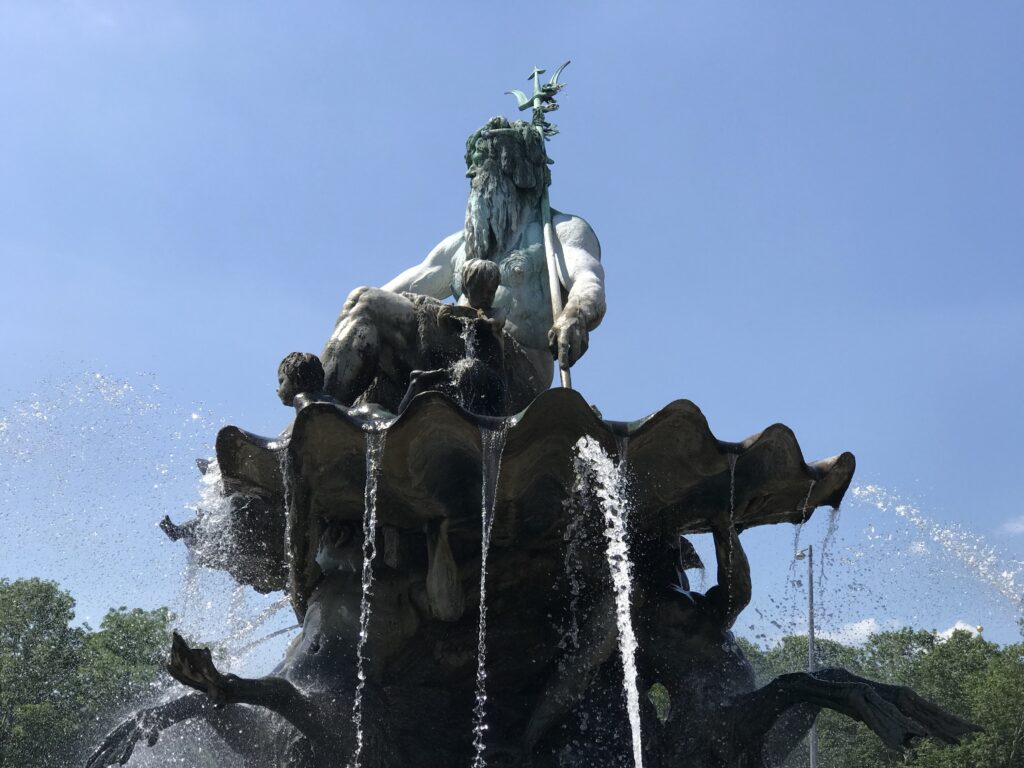
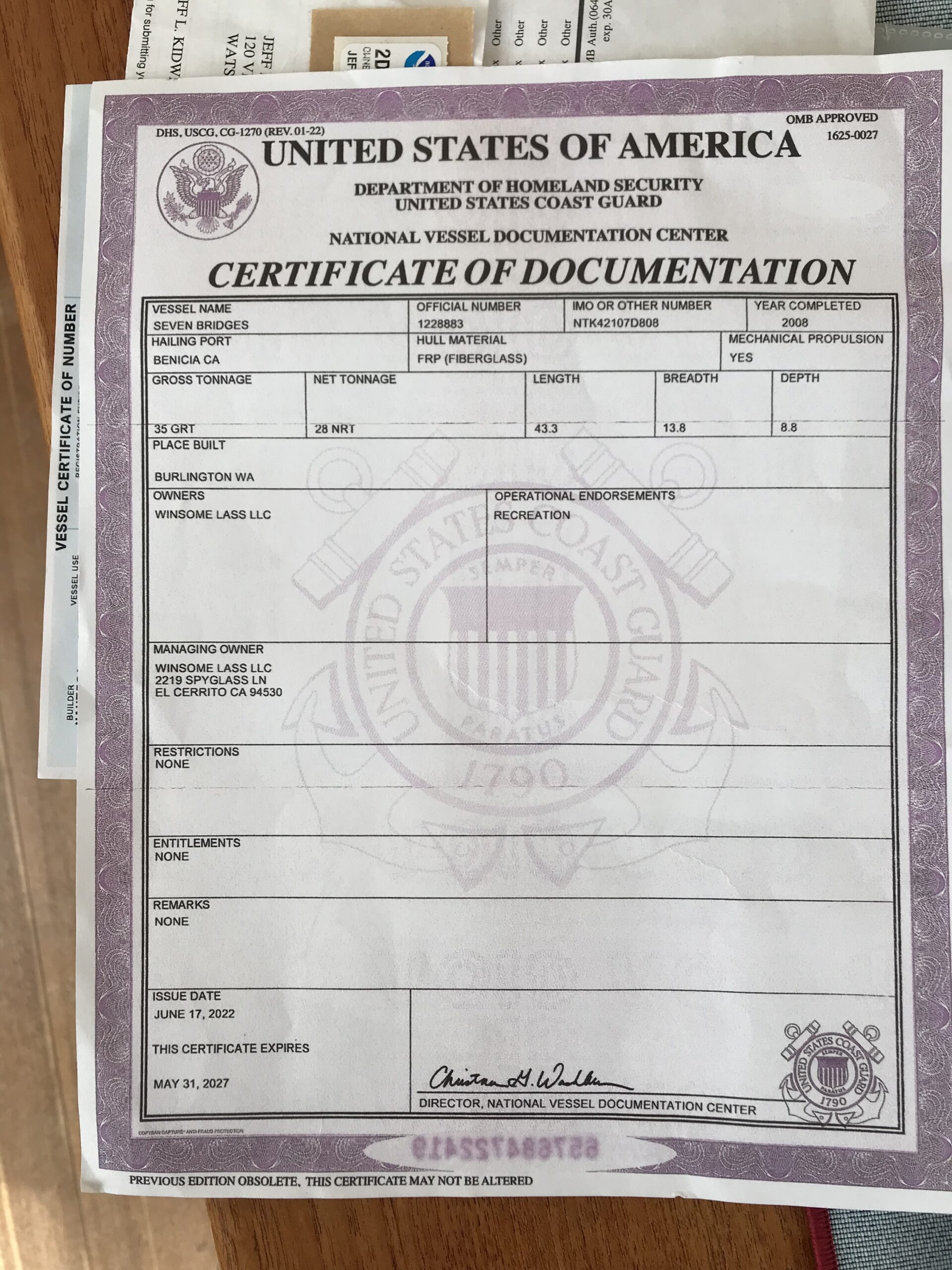
To legally change the name of a USA vessel, specific documentation and procedures must be followed. The process varies somewhat from state to state, but in general, the owner must present themselves in person or otherwise make arrangements at the USCG office or Maritime Documentation Center in their area. There are forms and a charge and then the wait for a response. The owner does not have to obtain a new title for the vessel but if the vessel isn’t an asset of a limited liability corporation (LLC) the insurance agency must be notified. LLCs, and the USA Navy, refer to vessel assets by hull numbers and not by name and hailing port. This means there are no changes to asset paperwork Radios need reprogramming (MSI and AIS) and this usually must be done by the manufacturer or representative.
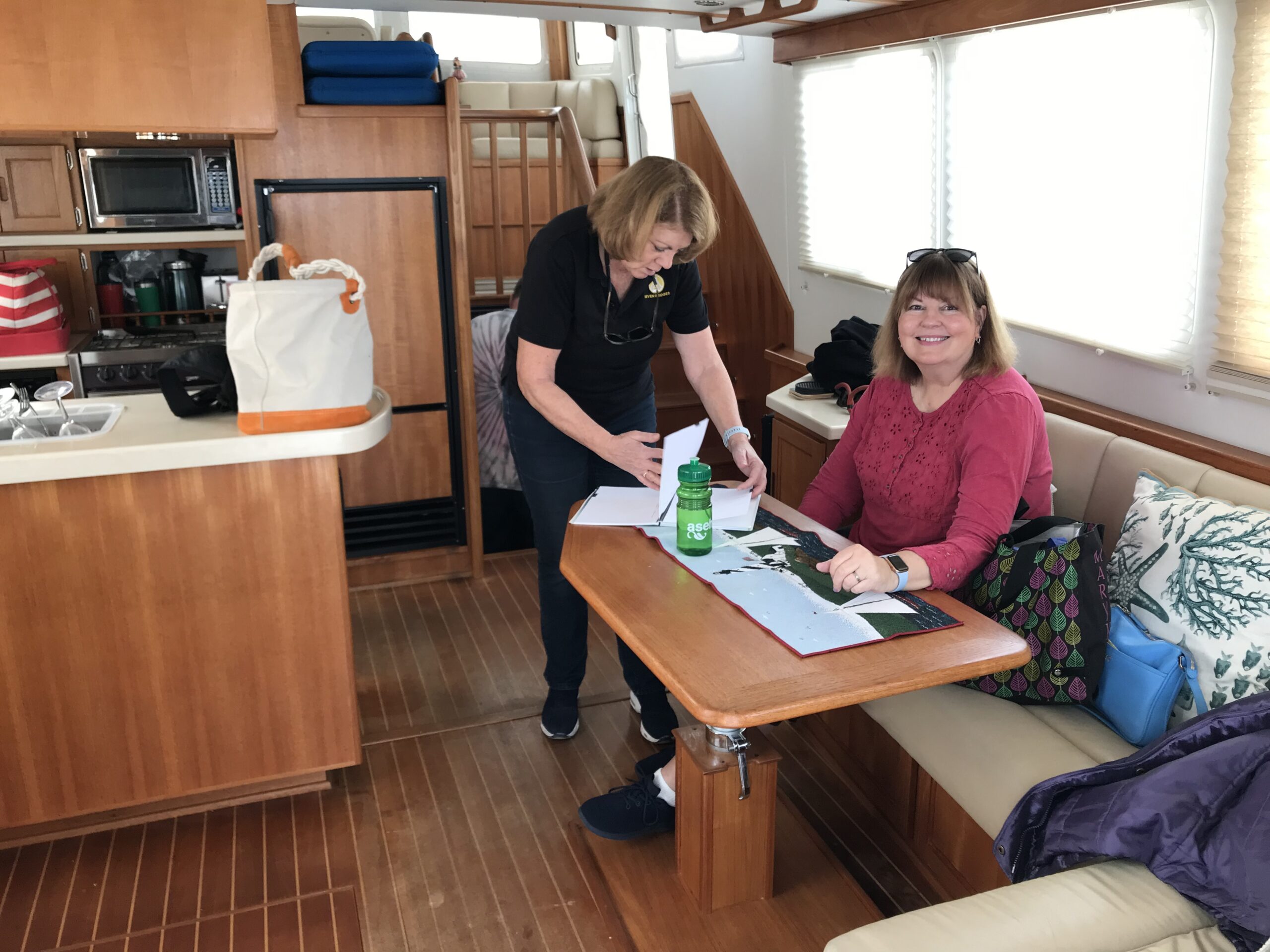
A legal name change is not a lucky name change. If nothing else is done, tradition says the owner and operator must plan for seven years of bad luck. Performing a traditional boat renaming ceremony to purge the boat’s name from the Ledger of the Deep and from Poseidon’s memory appears a prudent course of action- even for non believers in five pagan gods or bad luck because the seven years are avoided. If nothing else, crew will find comfort that the boat can no longer be assumed to be unworthy of luck.
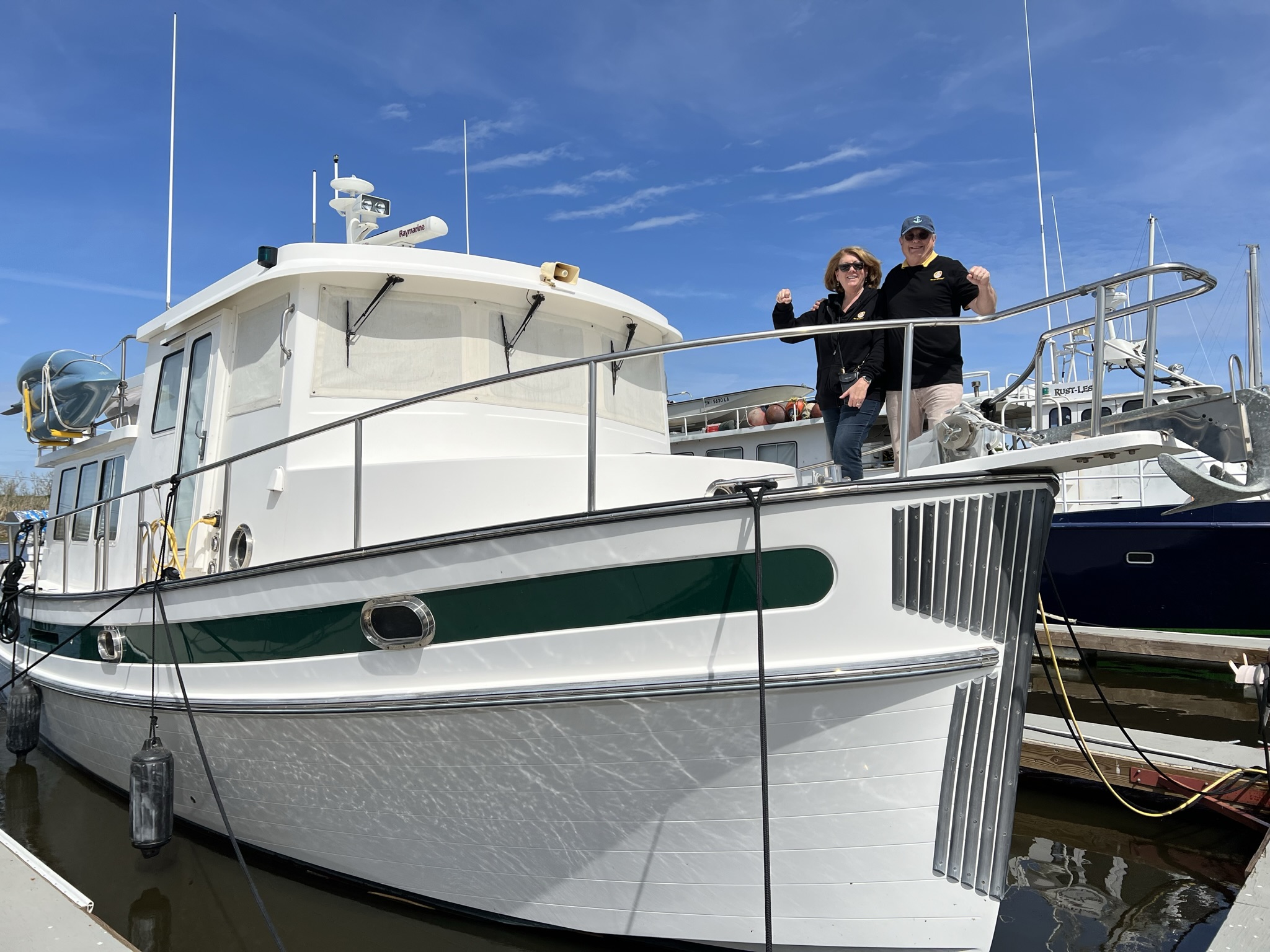
The ceremony involves removing or obliterating every trace of the boat’s current identity, sometimes after a grounding, preparing a metal tag that will rust with the old name written on it in water-soluble ink, and pouring reasonably good champagne into the water. A bottle may also be broken on the bow. At least two bottles are required.

Neptune’s role, and the role of the four wind gods, in the renaming process is related to superstition and legend. It is believed that every vessel is recorded in Neptune’s list of boats, and before adding a new one, the old name must be completely removed from his memory. But the role of crew, family, and friends is most important. The process involves a memorable ceremony and drinking good champagne!
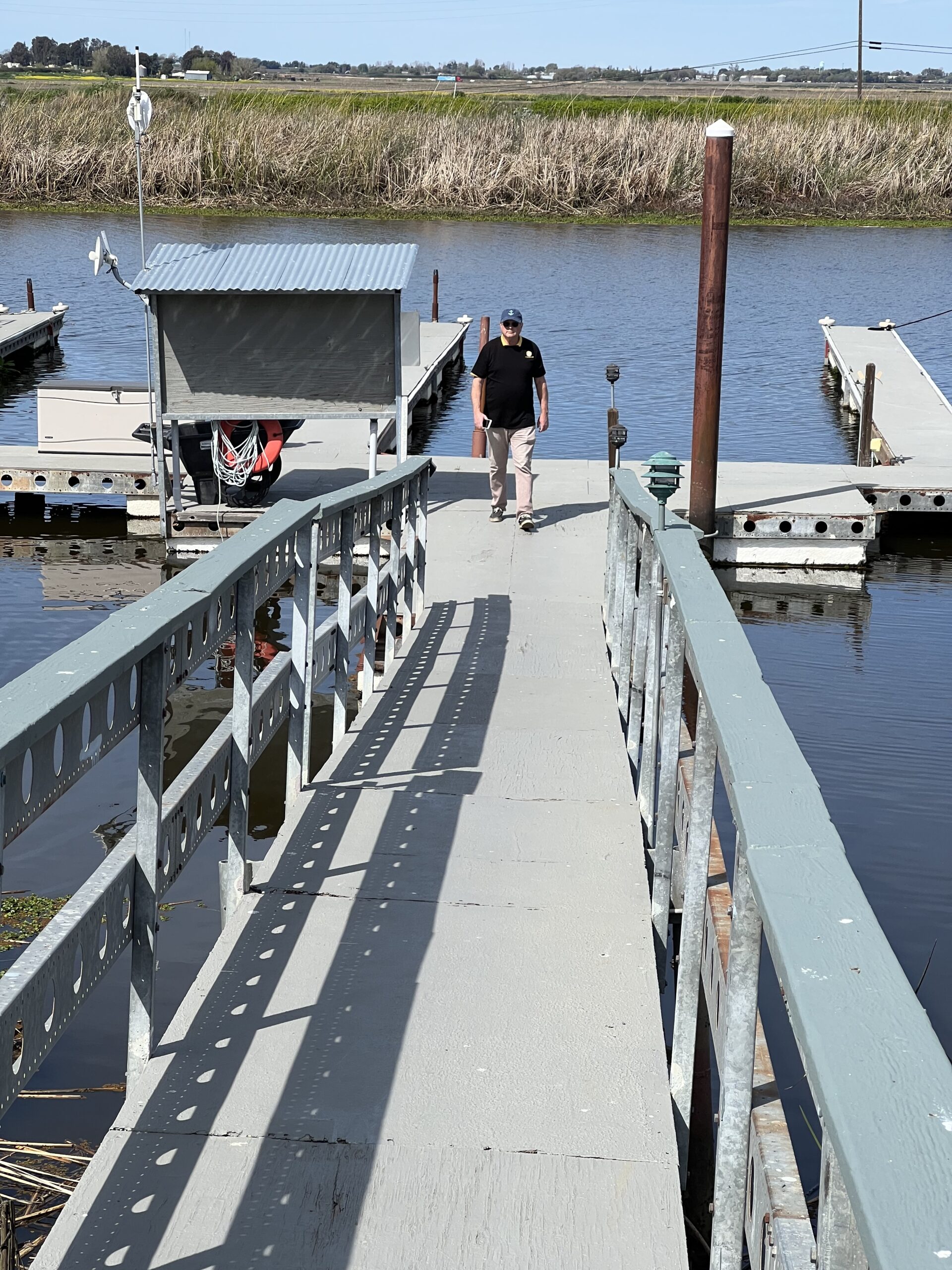
There are four gods of the wind which guide each direction of north, south, east, and west, and they are all brothers. The focus of the ceremony and drinking is on appeasing the brothers to ensure fair winds and smooth seas.
The six steps of the boat renaming ceremony are as follows:
- 1) Removing every trace of the old name from the boat, including hull logos, life rings, coasters, hats, shirts, towels, sails, keyrings, sail bags, ledgers, and boat records.
- 2) Performing a purging (sometimes called grounding) ceremony to cleanse the boat of its former name.
- 3) Performing a renaming ceremony to announce the new name of the boat.
- 4) Making a sacrifice, which may involve a metal tag with the old name written on it in water-soluble ink and a bottle of champagne.
- 5) Appeasing the brothers of the winds to ensure fair winds and following seas.
- 6) Toasting to the new name and celebrating the renaming of the boat and listing as an item of Neptune’s realm with an excellent party.
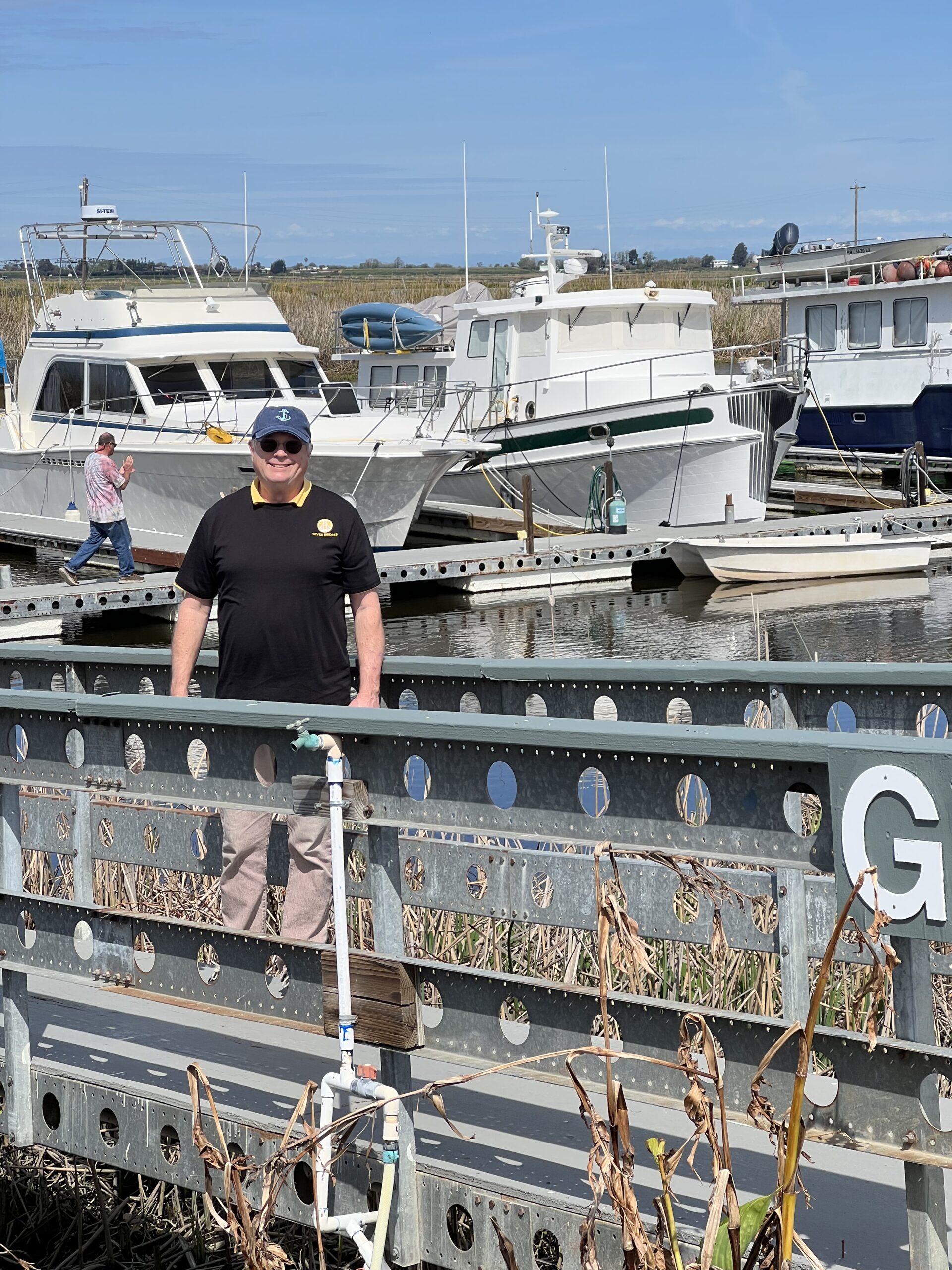
It is important to follow the above steps precisely to avoid bad luck and ensure a lifetime of good luck on the water. Also do not allow anyone to speak the old name or new name, while on board, except at appropriate times during the ceremony and do repeat the ceremony if is something is amiss.
There are also a few recommendations:
- Naming your vessel with seven letters will bring good luck to your journeys
- Including three “A’s” in the name of your boat is good luck
- Feminine names bring good fortune and protection to the vessel. However, they also lead to a future renaming ceremonies because of relationship changes.
- Naming a vessel after one that has previously sunk without glory is bad luck. This means naming a boat to honor one destroyed in battle is OK.
- Never sail on a boat without a name – it is bad luck. This means complete all six steps before getting underway. Then put greenery (a tree branch or lavender bunch) on the bow pulpit for the first boat excursion.
- Naming a boat after a storm or natural disaster will anger Poseidon (Neptune).
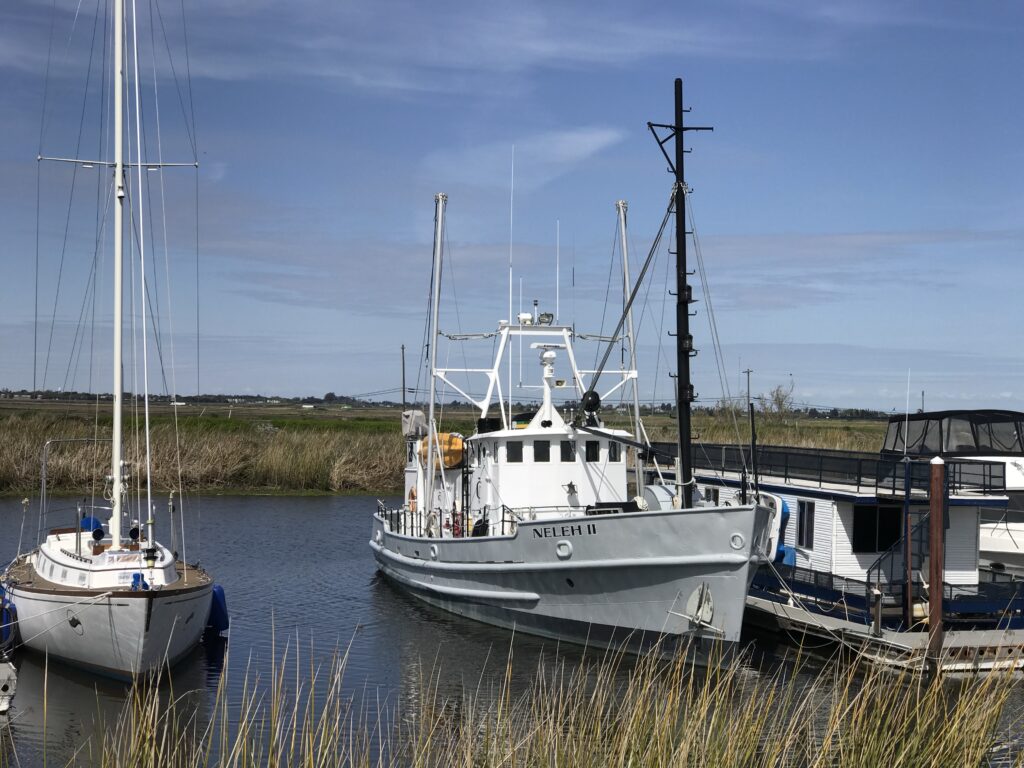
In the USA Navy…
Renamings usually take place because of an imperative to quickly honor a person or event. They can also accompany a change in function such as converting a ship to a different purpose or because a naming scheme for a certain class of ships might change. Other changes might be for stylistic or administrative reasons and in those cases the core names are retained even if the rendering changes. Prior to construction names have often been swapped among ships of a class for a variety of reasons, including the symbolism of building a particularly-named ship in a particular state or city.https://defaeroreport.com/2020/06/14/renaming-us-navy-ships/
Ships acquired from private or other sources have also frequently been renamed, especially ships transferred from the US Army or US Coast Guard to naval service. Hundreds of ships transferred from other government agencies such as the Maritime Commission or the Maritime Administration have been renamed upon being acquired for US Navy service.

Given the nature of USA sailors, you shouldn’t hold your ceremony on Friday. Major voyages are seldom started on Fridays. This may be owing to Good Friday, the day of crucifixion, or it may be because crew and dock workers are less focused on work on Fridays in anticipation of weekend time off. The USCG won’t rename a boat on Friday or process your paperwork for your vessels renaming.


Most renaming parties happen around Easter owing to the start of the boating season (called opening day) when the focus of a community is on boating. It’s best not to entice thunder or lightning on your maiden voyage. So Thor’s Day (Thursday) should be avoided. If Saturday doesn’t work, the old adage goes ‘Sunday sail, never fail. Friday sail, ill luck and gale.’
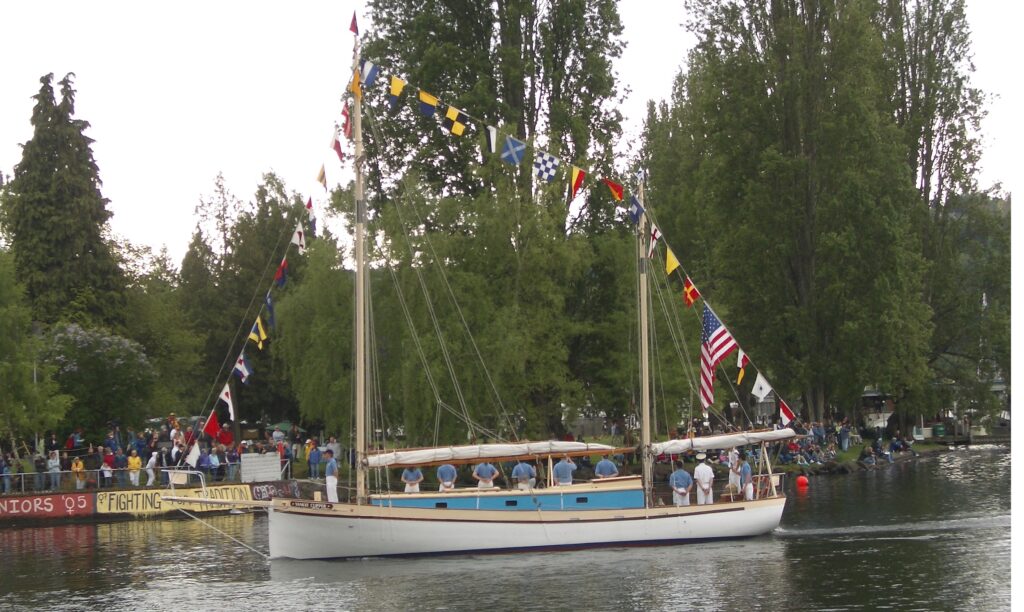
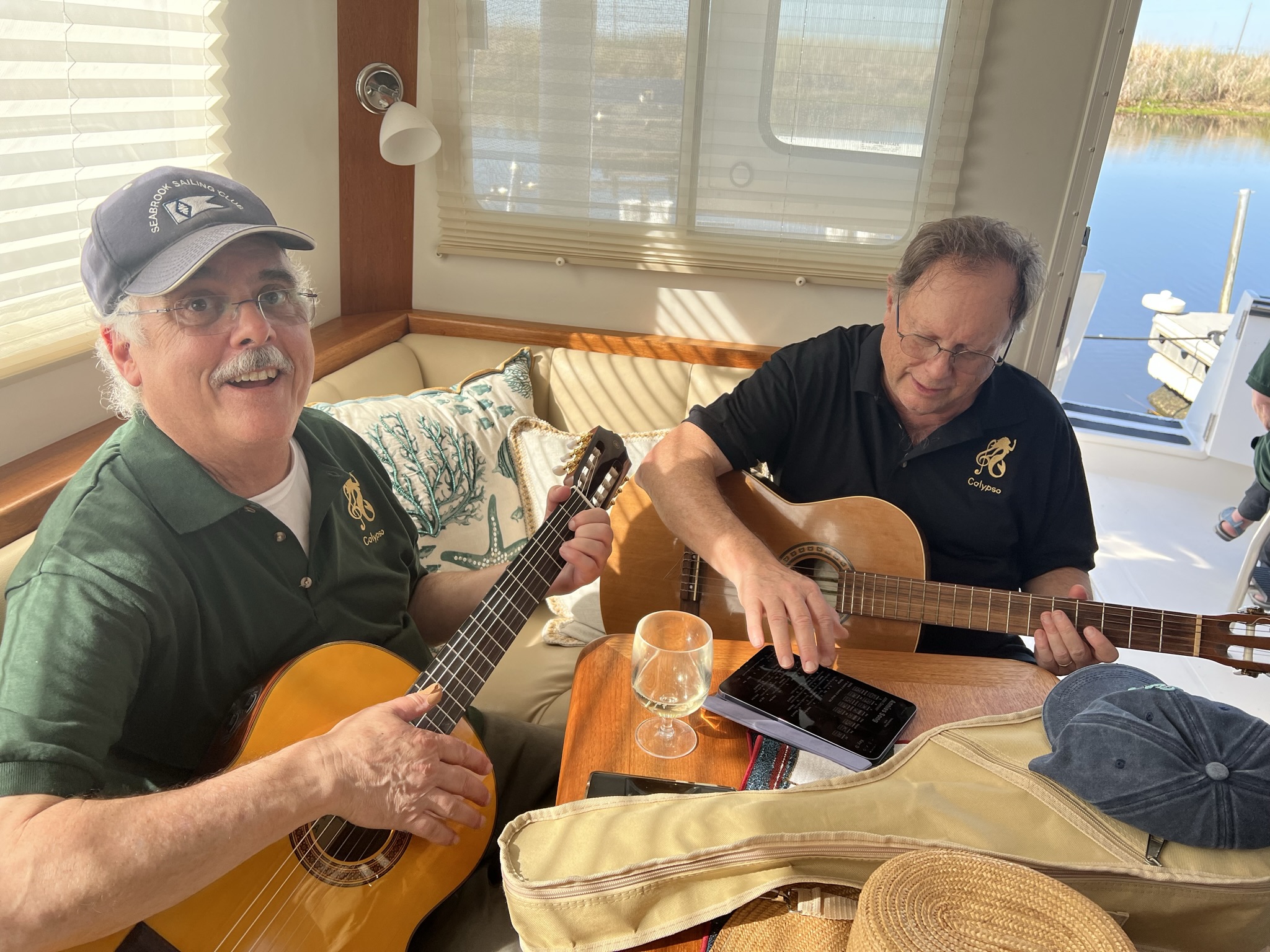
Another date to avoid is the first Monday in April. That’s the biblical date when Cain slew his brother and he was condemned to a lifetime of wandering. The wind brothers probably don’t like that day. April Fool’s Day should also be avoided. Boaters love shenanigans and if you attempt a christening on April 1st, friends might take advantage. My sister Pat chose the second Monday in April, right after Easter Sunday 2023. 14 attended. Two of four brothers, pictured to the right, after ceremonies learning to play Born to be Wild.
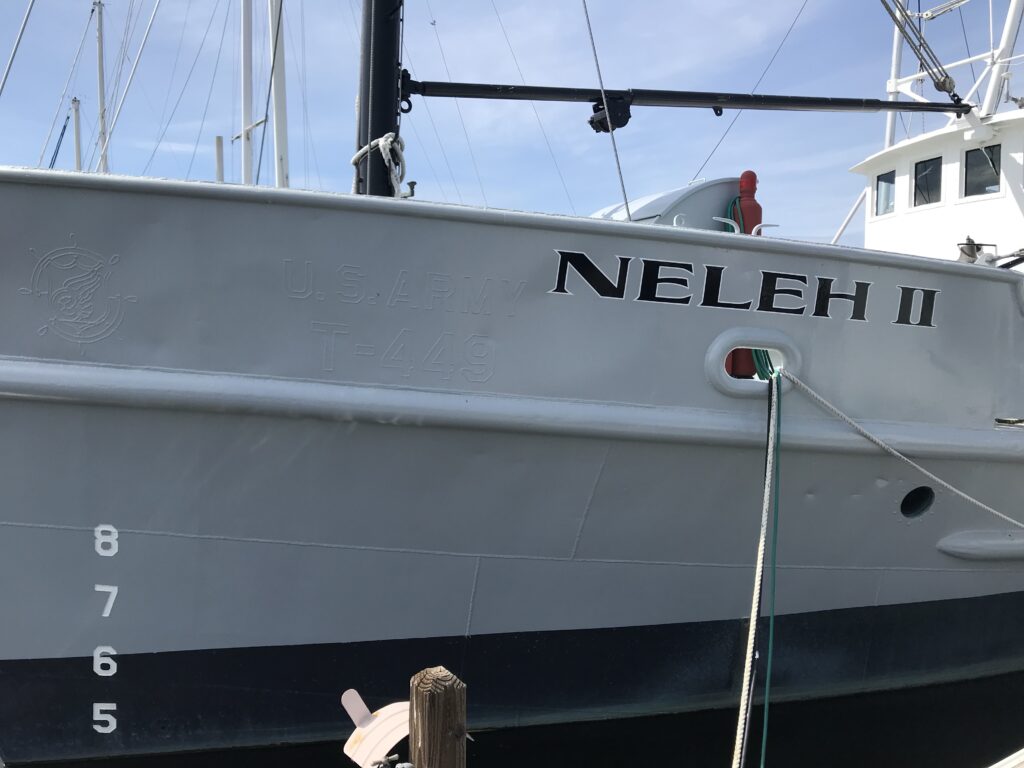
Tradition and Mythology rather than Organized Religion
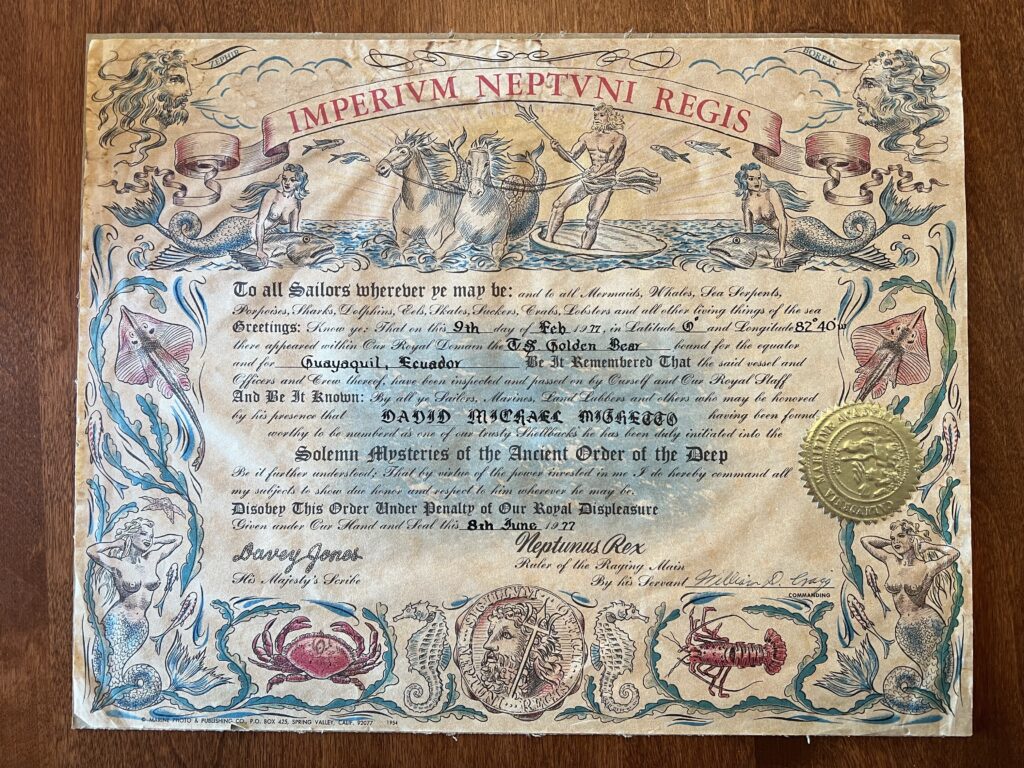
The boat renaming ceremony is sometimes found objectionable by Christian’s. The notion that Neptune and the four wind brothers are pagan gods which detract from belief in one God, is sometimes expressed. Analysis of the ceremonial document to the left is helpful.
Neptune and the wind gods are a maritime tradition. The ceremonies are not pagan rituals. They are entertainment. No boater should forgo Neptune Celebrations for religious reasons. Nonetheless, participation is voluntary. Fun Fun Fun.

The Imperivm Neptvni Regis document was presented for a first time crossing of the equator, called the line-crossing ceremony to my brother by the USA Navy. The line crossed is 00 latitude.

The tradition may have originated with ceremonies when passing headlands, and become a “folly” sanctioned as a boost to morale, or it may have been created as a test for seasoned sailors to ensure their new shipmates were dedicated to handling long, rough voyages. The ceremony typically features King Neptune and is common in the Navy, but is also sometimes carried out for passengers’ entertainment on civilian ocean liners and cruise ships. The ceremony may involve water baptism of passengers or crew who have never crossed the Equator before.
Line crossing ceremonies were sometimes known to become brutal hazing events, where the uninitiated often were beaten with wet ropes or fire hoses. During WW2, United States Navy ship logs often recorded additional visits to sickbays immediately after the particular ship had crossed the line. One such example was when aircraft carrier USS Franklin crossed the equator in the Pacific Ocean on 20 Sep 1944. “[A]ll hell broke loose”, recalled Electrician’s Mate 2nd Class Bob St. Peters. “The shellbacks grabbed pollywogs and started beating them. Actually beating them.” He was one of the victims as well by members of his station, who gave him electric shocks with a hand-cranked generator as part of his initiation. Seaman 2nd Class George Sippel remembered beatings, hair shavings, tarring, painting, humiliation, and other forms of hazing, but he explained it as a rite of passage that, when all was said and done, all sailors enjoyed. He saidYou’ve got to understand why this is done. It’s all navy tradition, sure, but all we had was each other. There was no liberty, we weren’t going ashore, and no one was going to see you. Your hair was going to grow back; the grease and paint will come off, and things will turn back to normal. After it was over, we grew closer and it tightened up the crew. For me it’s a fond memory and all part of being in the navy.
In 1995, the line crossing ceremony aboard an Australian submarine was deemed as sexual assault upon the uninitiated, and the news came before public scrutiny. Navies of the world began curtailing or banning the ceremony in the 1980s.
https://www.history.navy.mil/browse-by-topic/heritage/customs-and-traditions0/crossing-line.html
Shellbacks (or, Sons Of Neptune) are those who have crossed the equator before. Pollywogs have not. Pollywogs suffer small indignities during line crossing to become sons and daughters of Neptune. Today, it is required that ceremonies be fun rather than solum or serious.

There is no ceremony for crossings of 00 longitude. However analysis of the Imperivm Neptvni Regis document presented earlier shows depictions of only 2 wind gods and they are the gods blowing north and south, the wind direction needed to reach the equator. David speculated that if there were a ceremony for crossing 00 longitude, the gods for east and west would undoubtedly be depicted. Isn’t this fun.
The point is that Christian’s are not known to worry about the equator crossing and shouldn’t worry about boat naming ceremonies either. The ceremonies used for MV Seven Bridges, a 42’ Nordic Tug are below:
Purging Ceremony
Once the name was completely removed from the boat, it was time for the purging ceremony to take place.
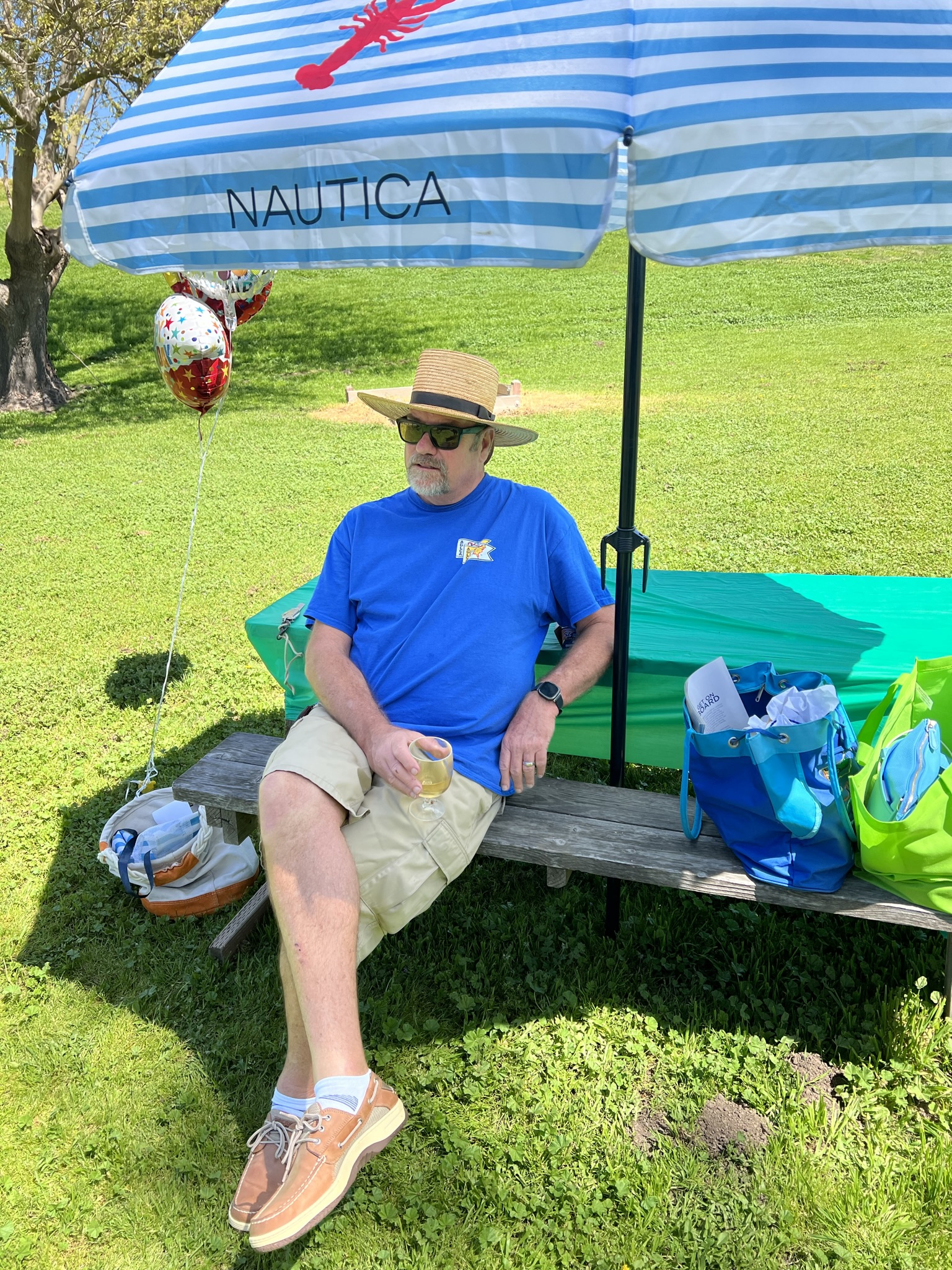
The old name of the boat – Seven Bridges – was written on a metal tag in water-soluble ink. The metal should be the kind that will rust or degrade away. Two bottles of libation (most often high quality French Sparkling wine from the Champagne region) are needed for the ceremony. These are sacrificed in half bottle increments.
With the metal tag and one bottle close by, the following recited.
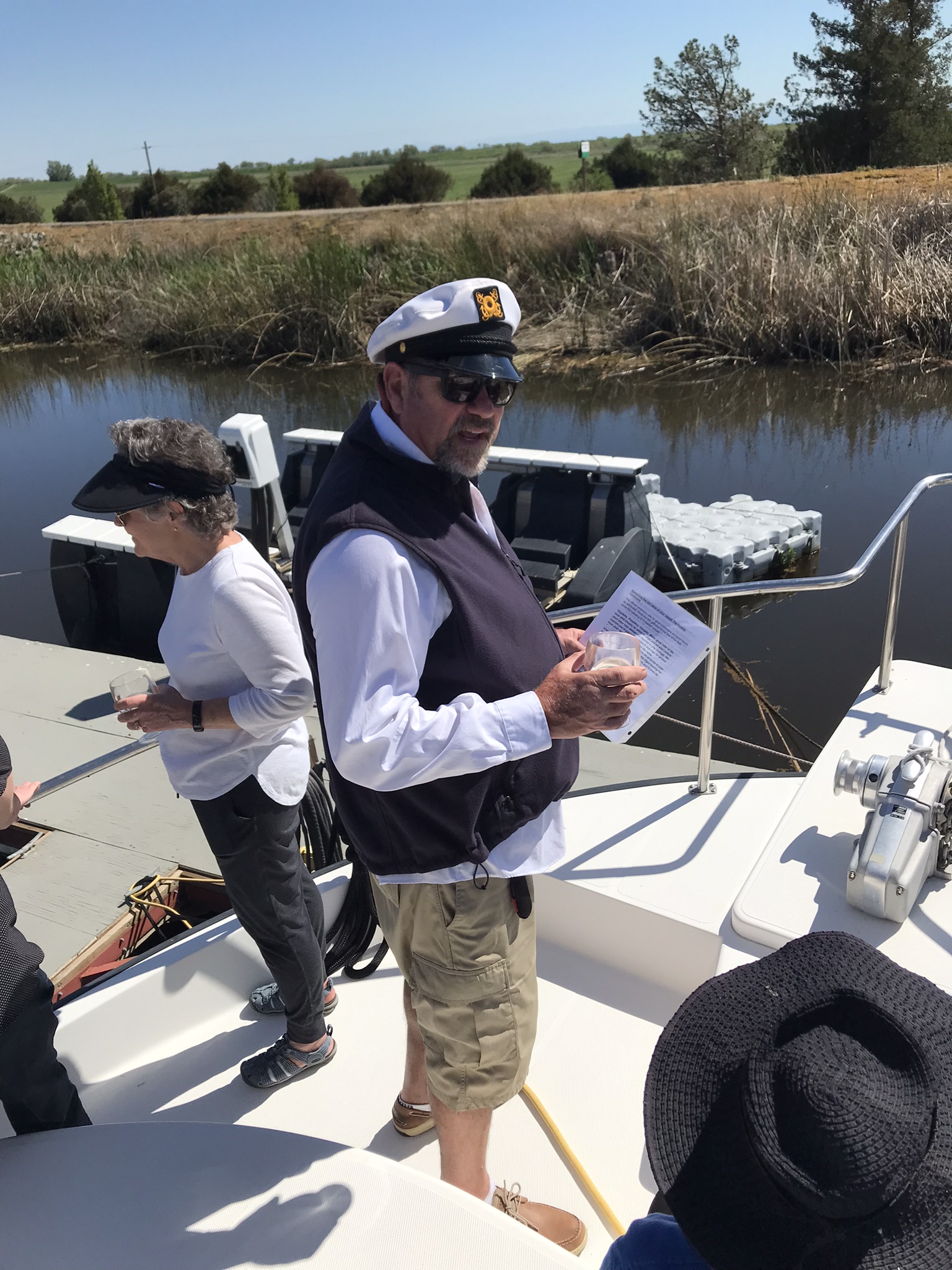
“Oh mighty and great ruler of the seas and oceans, to whom all ships and we who venture upon your vast domain are required to pay homage, implore you in your graciousness to expunge for all time from your records and recollection, the name Seven Bridges which has ceased to be an entity in your kingdom. As proof thereof, we submit this ingot bearing her name to be corrupted through your powers and forever be purged from the sea.”
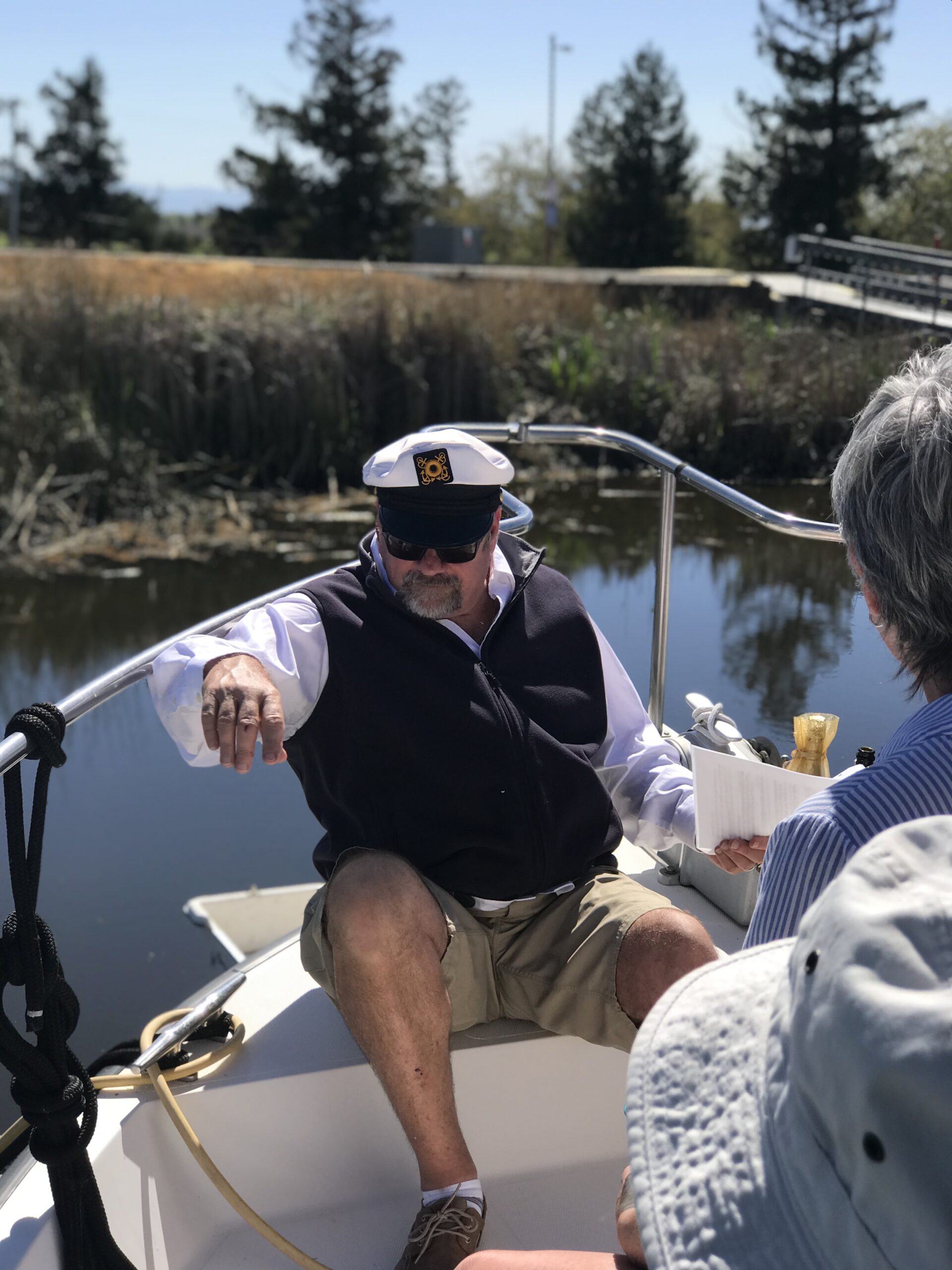
The metal tag that had the boat’s old name written on it was then dropped into the water from the bow of the boat.
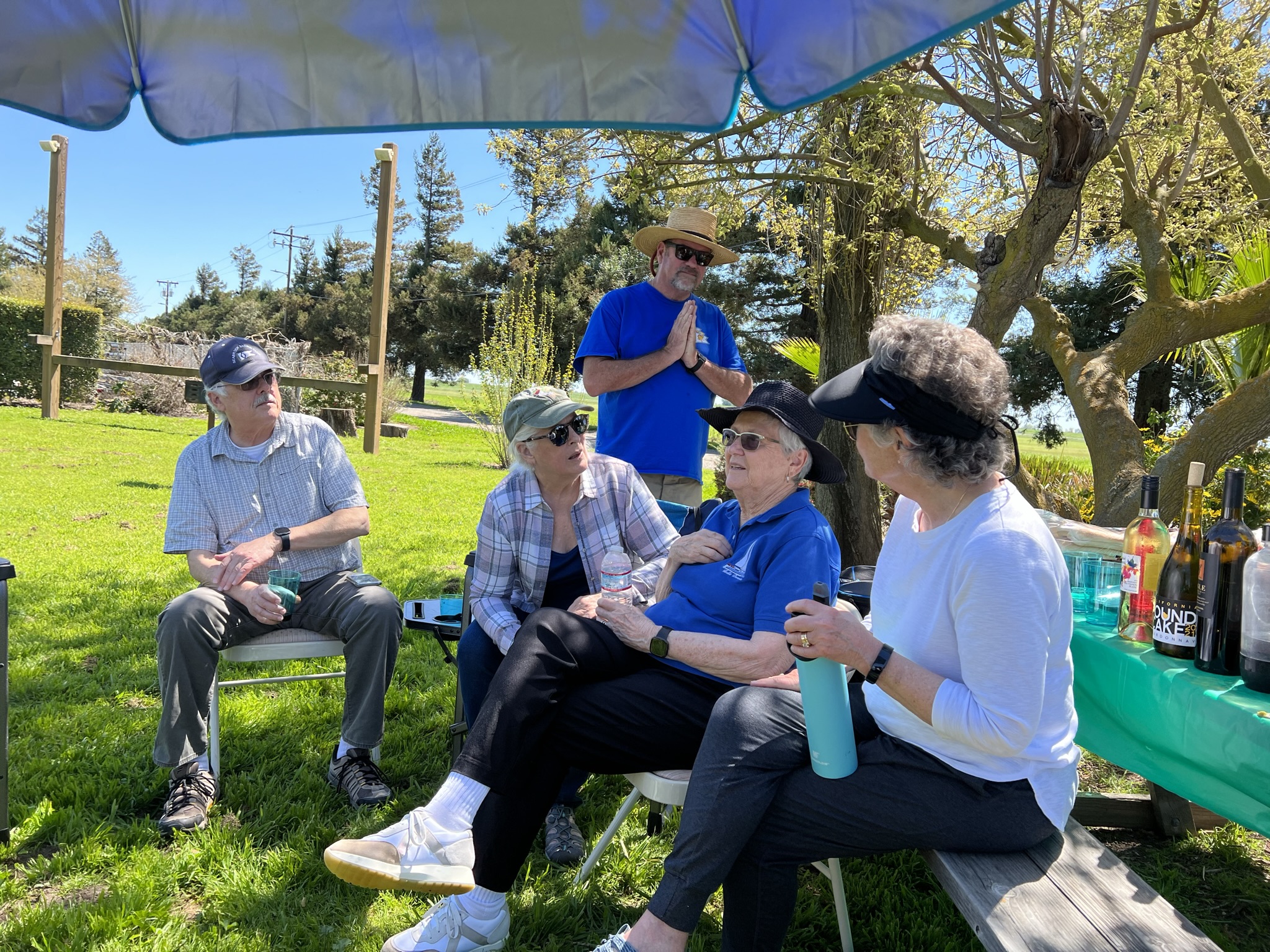
At least half of the bottle was poured into the water from east to west. The remaining libation was passed around and consumed by the guests at the ceremony. In our case, most came with almost full glasses from the picnic.
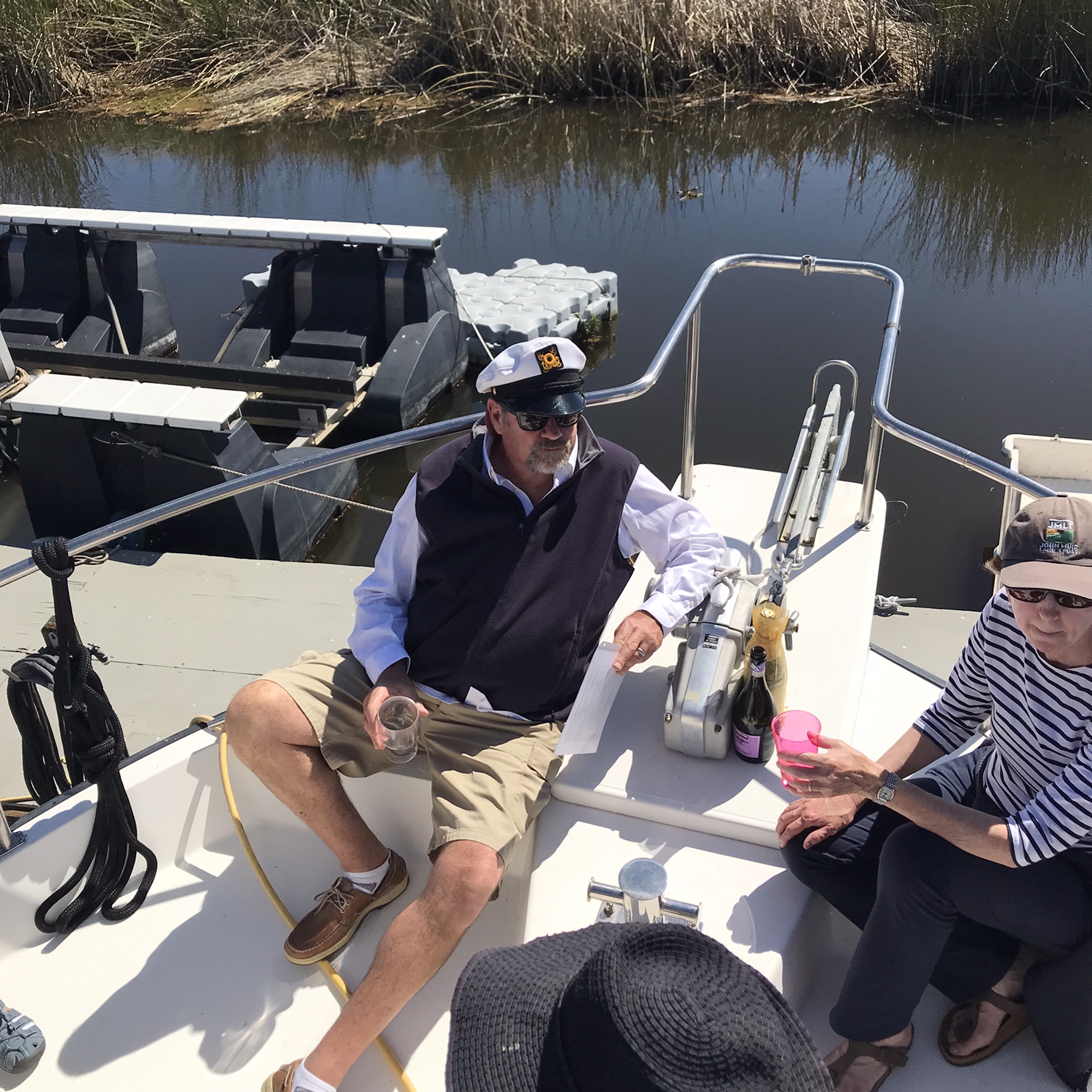
A short rest after the purging ceremony was taken before Davy Jones (played unofficially by me) brought the readings for renaming. Davy Jones is a legendary figure in maritime folklore who is believed to be the spirit of the sea. In the Navy tradition, Davy Jones is the first assistant to King Neptune.
Renaming Ceremony
Like the renaming ceremony, a line crossing folly comes in two parts. While a renaming can be done on two days, the line crossing must be done in two, with pollywog invitations starting a day before reaching the equator and court proceedings after. There are no hard and fast rules. It is like the pirate code – more like guidelines. Steve states. Then he with help from Pat read from the standard script.
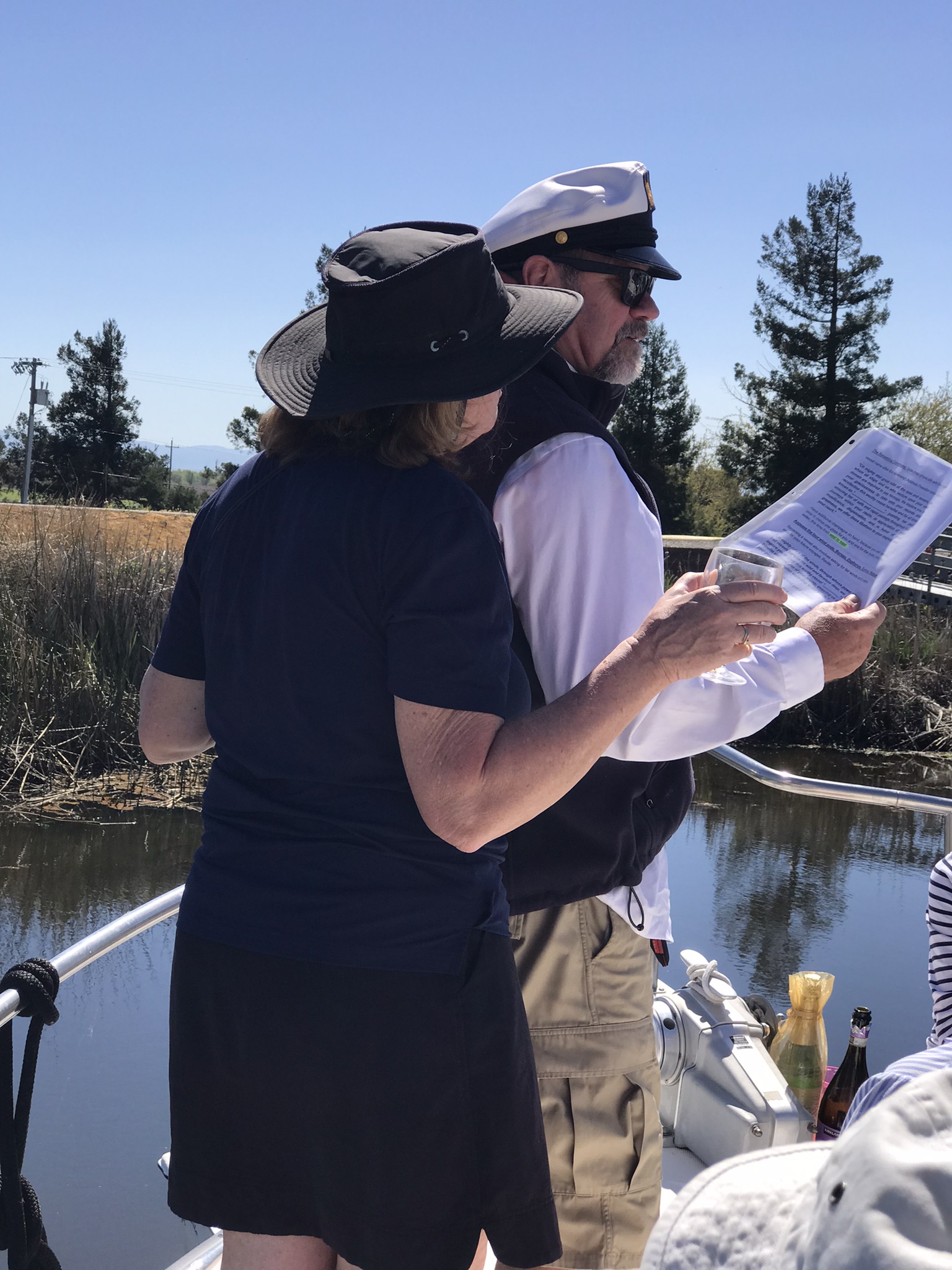
Steve and Pat read: “Oh mighty and great ruler of the seas and oceans, to whom all ships and we who venture upon your vast domain are required to pay homage, implore you in your graciousness to take upon your records and recollection this worthy vessel hereafter and for all time known as Calypso guarding her with your mighty arm and trident and ensuring her of safe and rapid passage throughout her journeys within your realm. In appreciation of your munificence, dispensation, and in honor of your greatness, we offer these libations to your majesty and your court.”
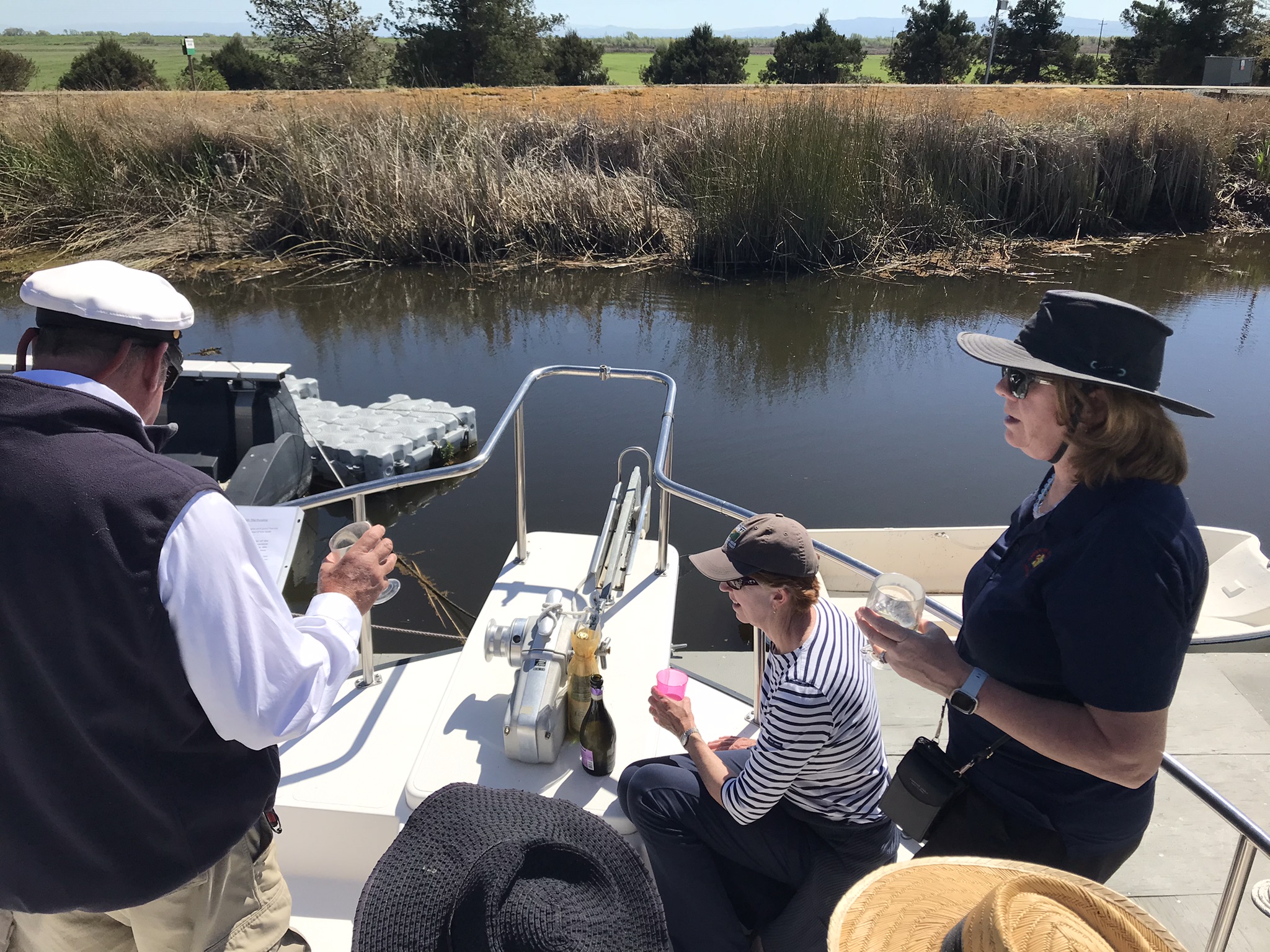
About half a bottle of Italian Prosecco was poured into the sea from west to east. Any good quality libation is allowed. Many in attendance are of Italian ancestry. Hence Italian Prosecco rather than a French libation. The rest of the bottle was passed around. Poseidon’s Prosecco, in combination with that from the purging celebration, now totaled one full bottle.
The gods of the sea vary across different mythologies. In Greek mythology, the gods of the sea are Poseidon, the god of the sea, earthquakes, and horses, and Nereus, a sea god and the son of the ancient Titans Pontus and Gaia. Poseidon was considered the tempestuous Greek god of the sea and brother of Zeus. His Roman equivalent is Neptune. In other mythologies, there are other gods of the sea. For example, in Hindu mythology, Varuna is the god of the sea and the celestial ocean. In Norse mythology, Aegir is the god of the sea and the ruler of the waves[. In Polynesian mythology, Tangaroa is the god of the sea and the creator of fish.
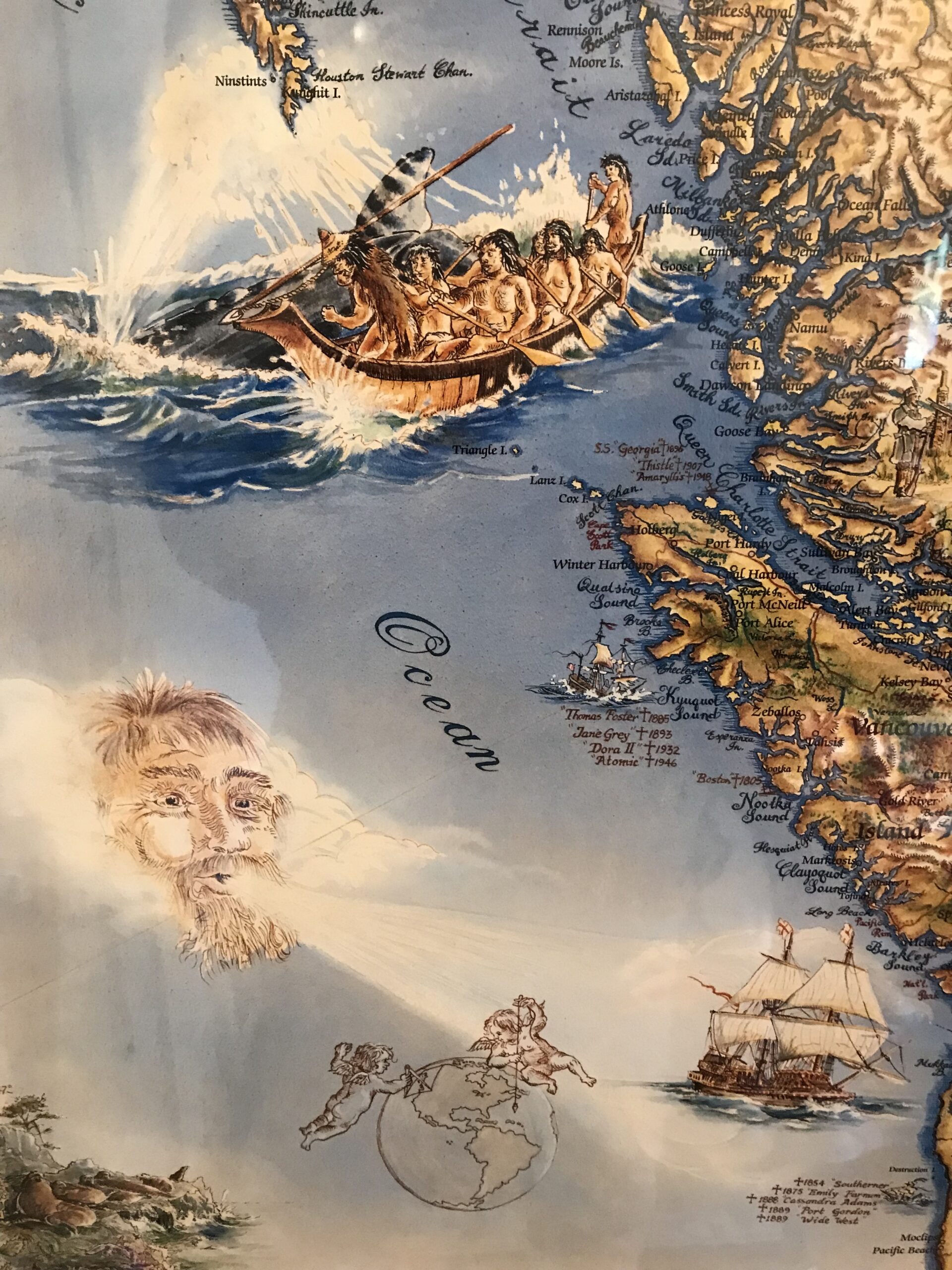
With the gods of the sea appeased, the gods of the wind were addressed. There are four gods of the wind which guide each direction of north, south, east, and west. As mentioned, the four gods are all brothers, but women stand in for them during this ceremony. They stand on the bow, stern, port and starboard, with flutes full of Prosecco, as Steve addresses them individually.
“Oh mighty rulers of the winds, through whose power our frail vessels traverse the wild and faceless deep, we implore you to grant this worthy vessel Calypso the benefits and pleasures of your bounty, ensuring us of your gentle ministration according to our needs.”
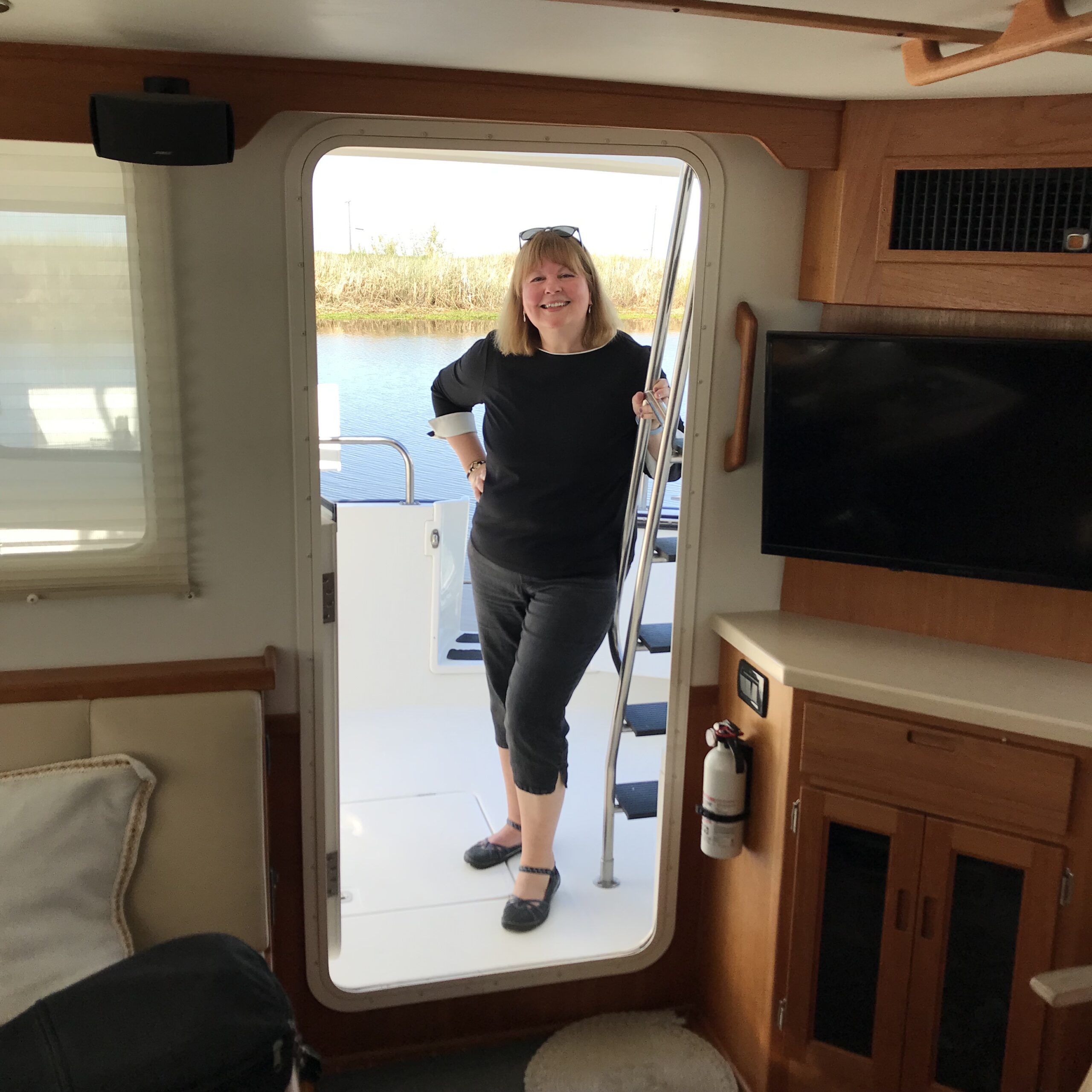
The first individual to be address is Boreas, the god of north wind. Facing north, on the stern, Lisa poured Prosecco from her flute into the water as the following was recited.
“Great Boreas, exalted ruler of the north wind, grant us permission to use your mighty powers in the pursuit of our lawful endeavors, ever sparing us the overwhelming scourge of your frigid breath.”
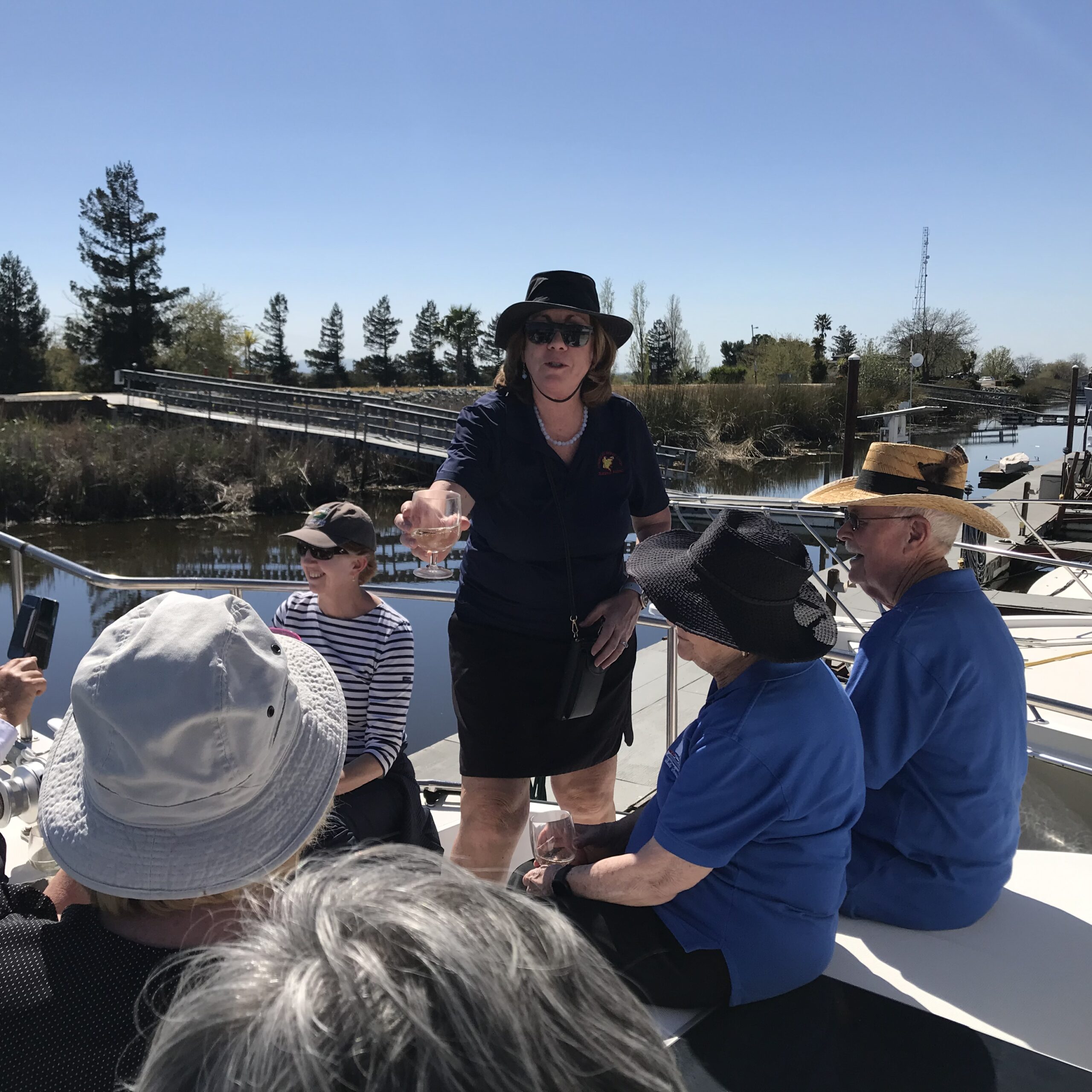
The next god to address is Zephyrus, the god of the west wind. The same process was executed except to the west with the following recited.
“Great Zephyrus, exalted ruler of the West Wind, grant us permission to use your mighty powers in the pursuit of our lawful endeavors, ever sparing us the overwhelming scourge of your wild breath.”

The third god to be addressed is Eurus, the ruler of the east wind. Again, the same process was executed but to the east with the following being recited.
“Great Eurus, exalted ruler of the East Wind, grant us permission to use your mighty powers in the pursuit of our lawful endeavors, ever sparing us the overwhelming scourge of your mighty breath.”
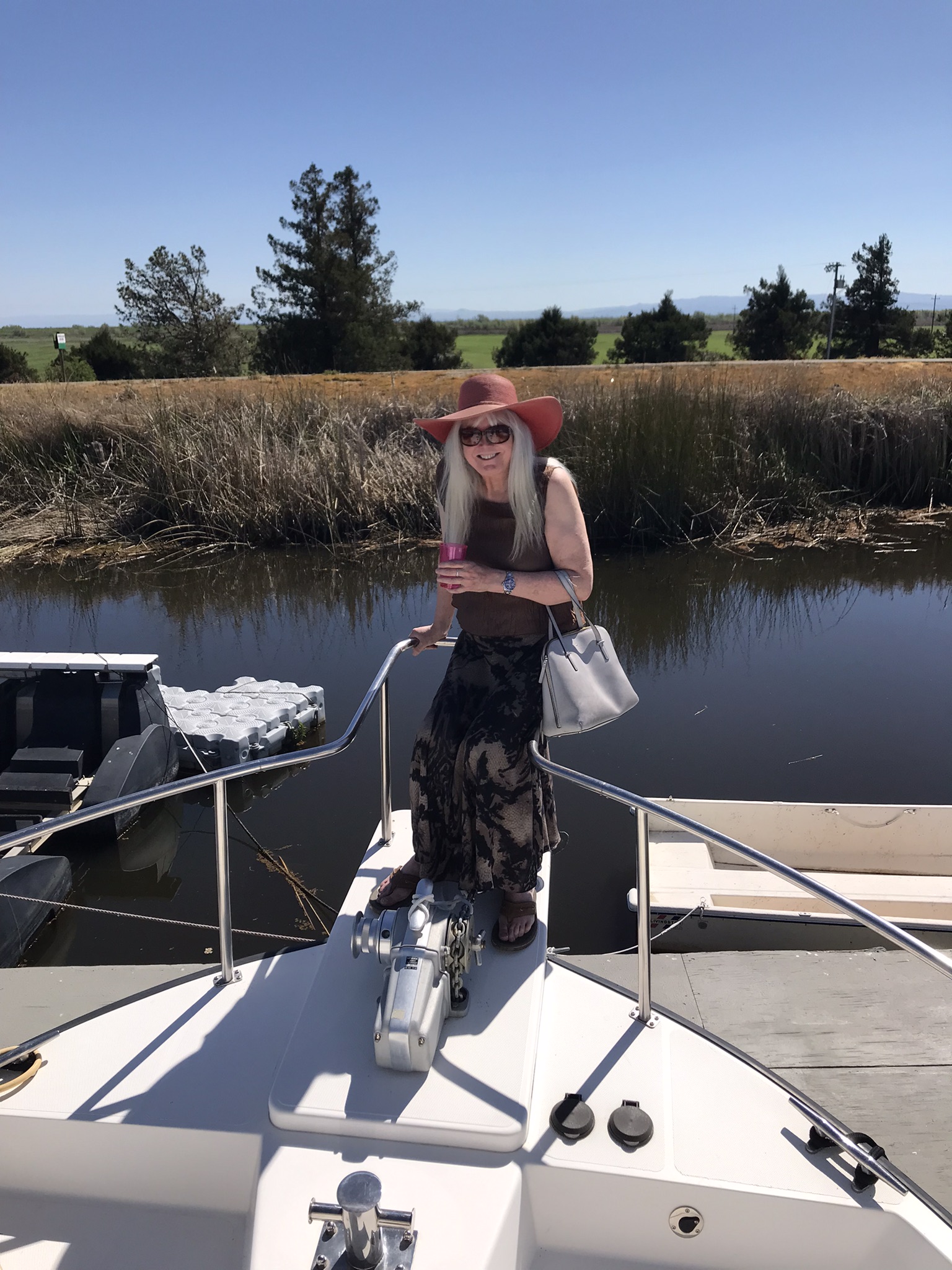
Finally, Notus, the god of the south wind is addressed. Once again, the same process was executed and the following recited.
“Great Notus, exalted ruler of the South Wind, grant us permission to use your mighty powers in the pursuit of our lawful endeavors, ever sparing us the overwhelming scourge of your scalding breath.”
Steve then explained that a poem is often recited at closing. But in this case – and owing to competency gained at the pre ceremony party where it was practiced – the poem would be sung.
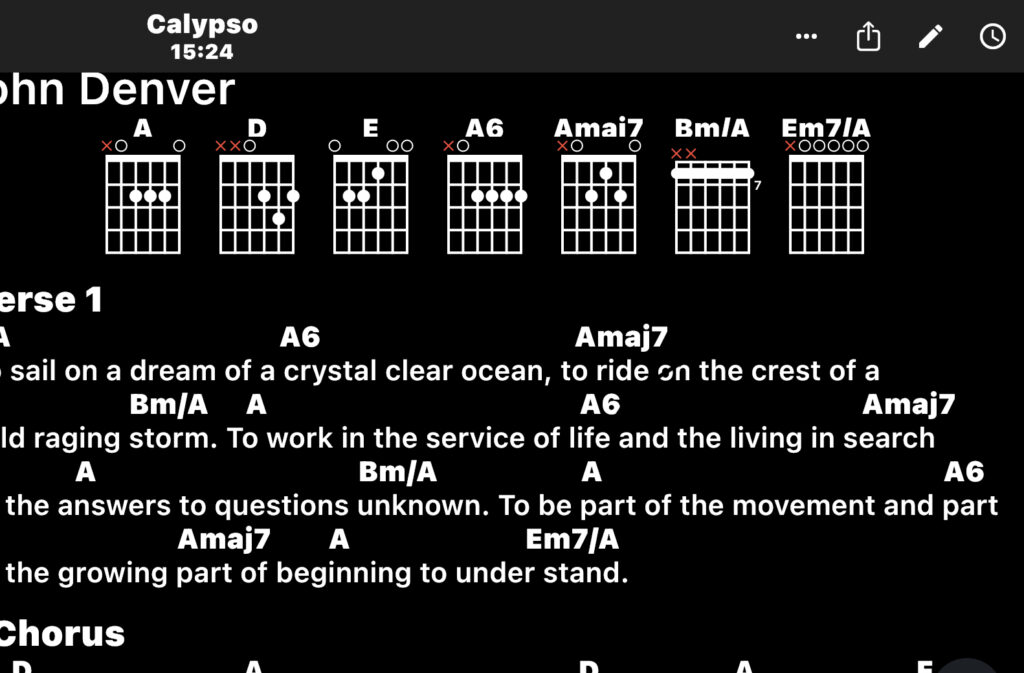
This is the only song I am aware of where a ships bell is rung multiple times. Guitar, Ukulele, Bell, and Yodeling, were featured. It was quite a production.
At the end of the singing, all attendees were asked to return to the picnic area and freshen up for the group photo. Shirts had been distributed earlier with instructions not to bring them aboard until later. After about 30 minutes, all returned wearing the Calypso shirt and the photo below was taken.
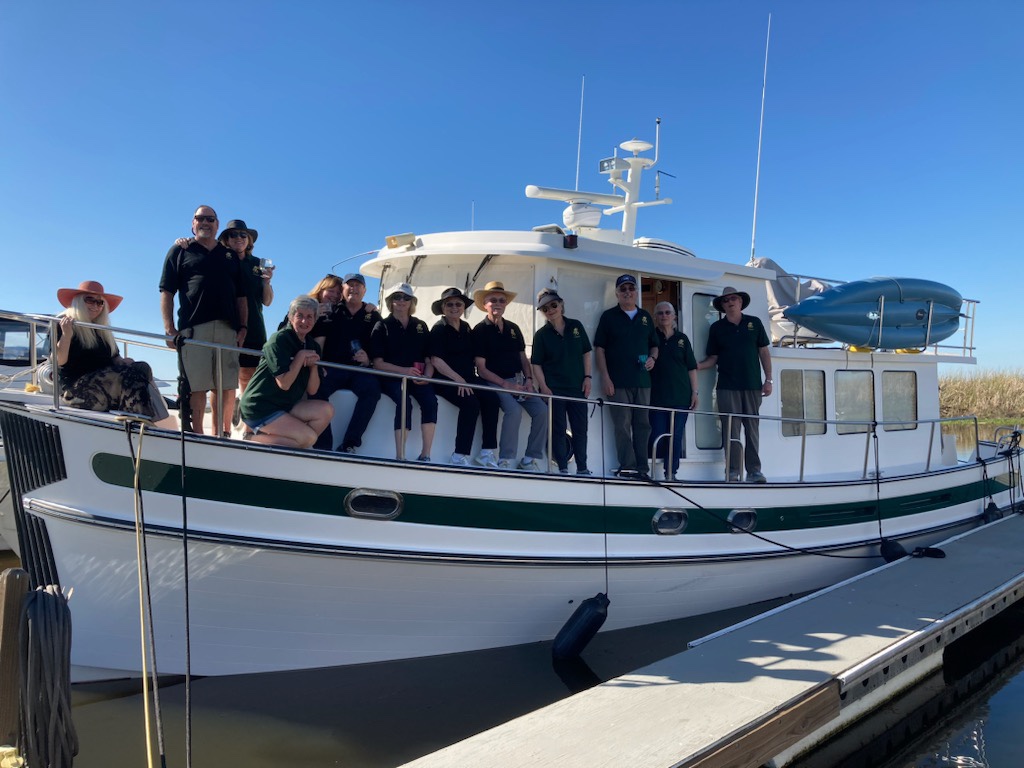
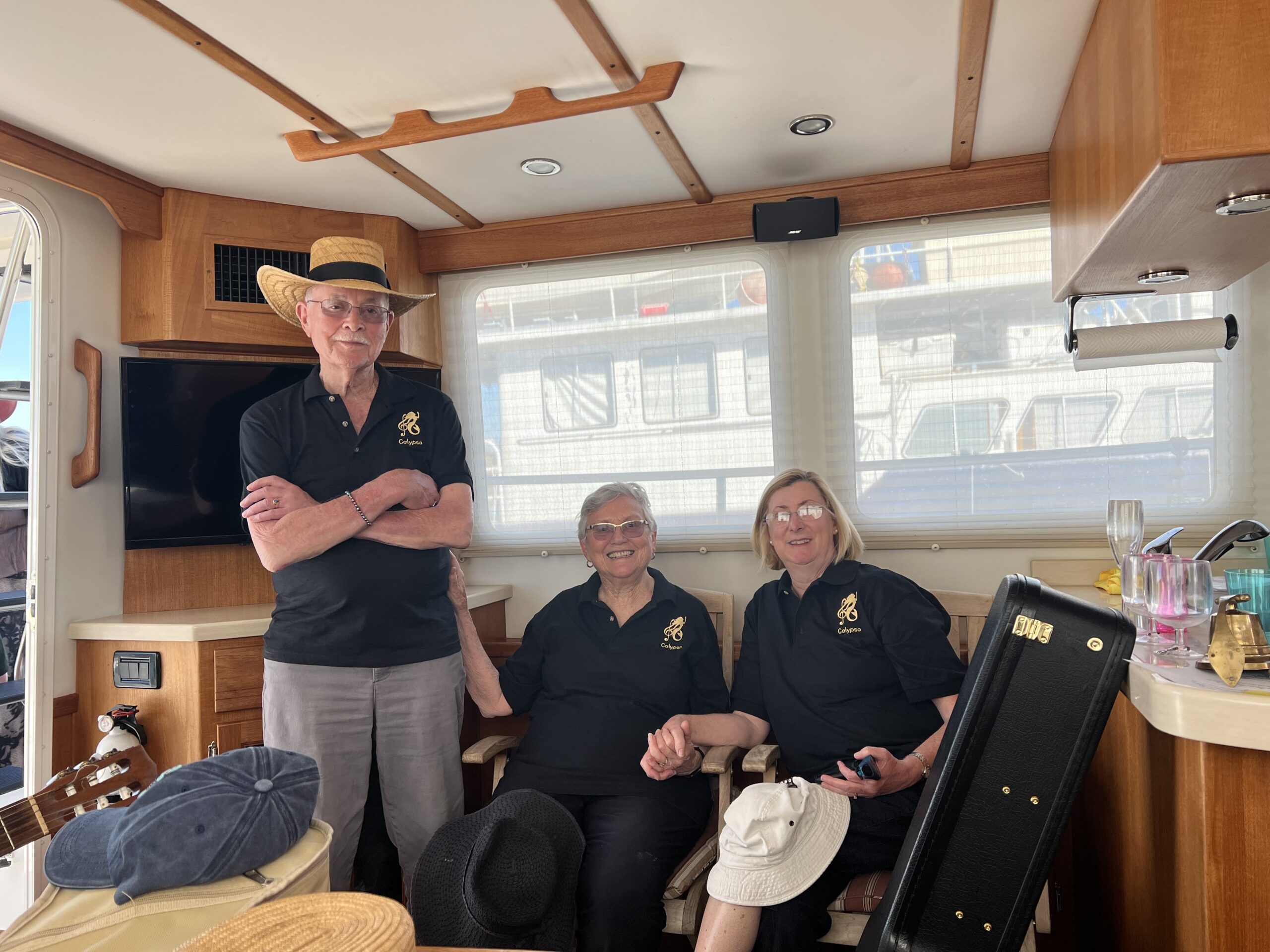
The ceremonies had lasted past 4 PM, and most departed after the photo. Thankfully, Steve and Saundra Mighetto stayed afterwards to clean up the picnic area while Pat Mighetto Stanley and Steve Stanley cleaned up the boat and restored important documents to Calypso so she could legally cruise. The rest of the story is why Seven Bridges, a well known vessel in the San Francisco Bay Area – where there are seven bridges – had been renamed.
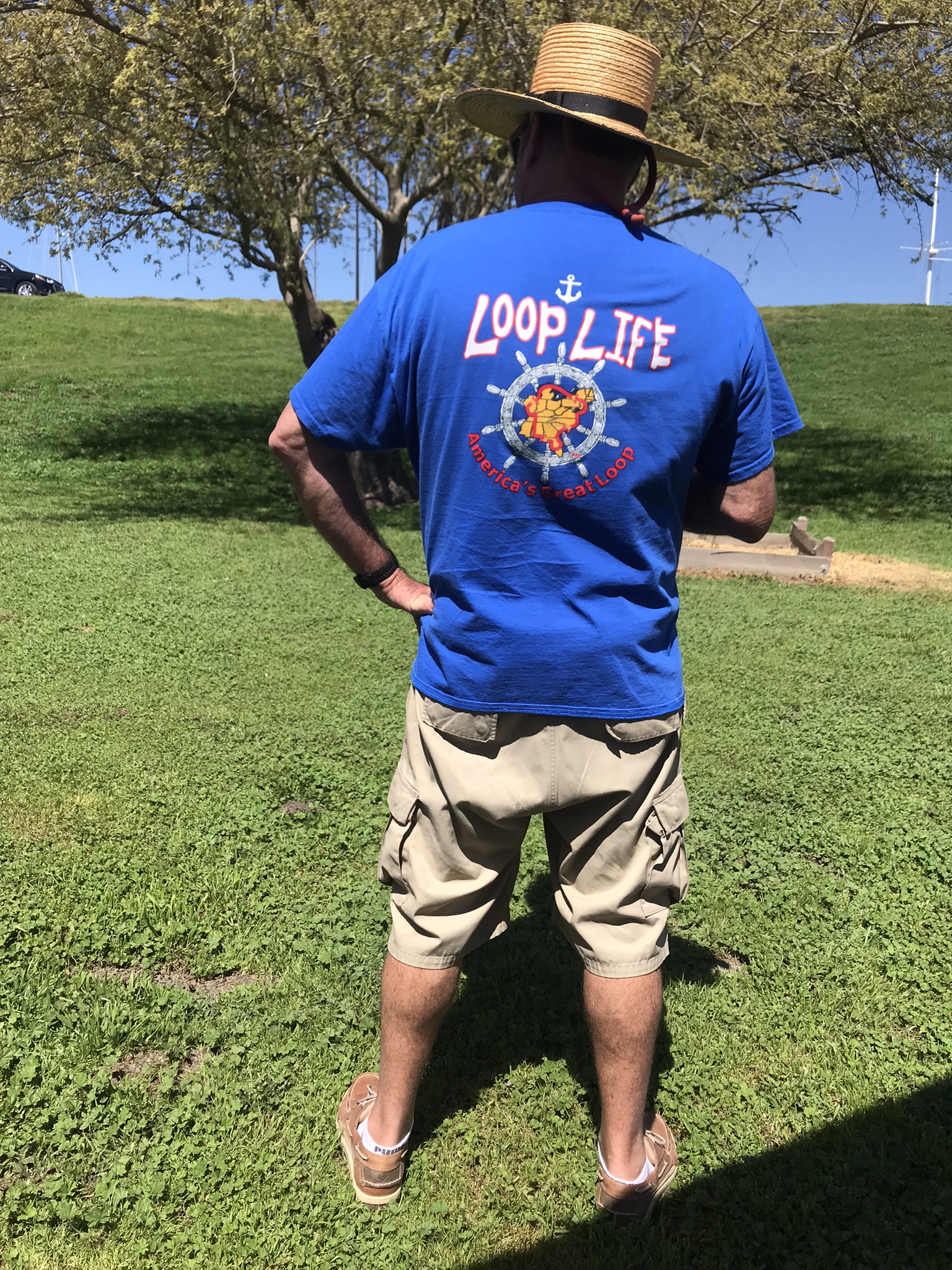
Steve and Pat Stanley had just completed a year long Great Loop. For that effort, they purchased a MainShip 42 which had done the loop twice before and they mothballed the Nordic Tub that year. This was less extreme than shipped the Nordic Tug for looping. After upgrades they renamed the Mainship 42 Calypso. It had held the name Not Ready (not ready to do the loop).
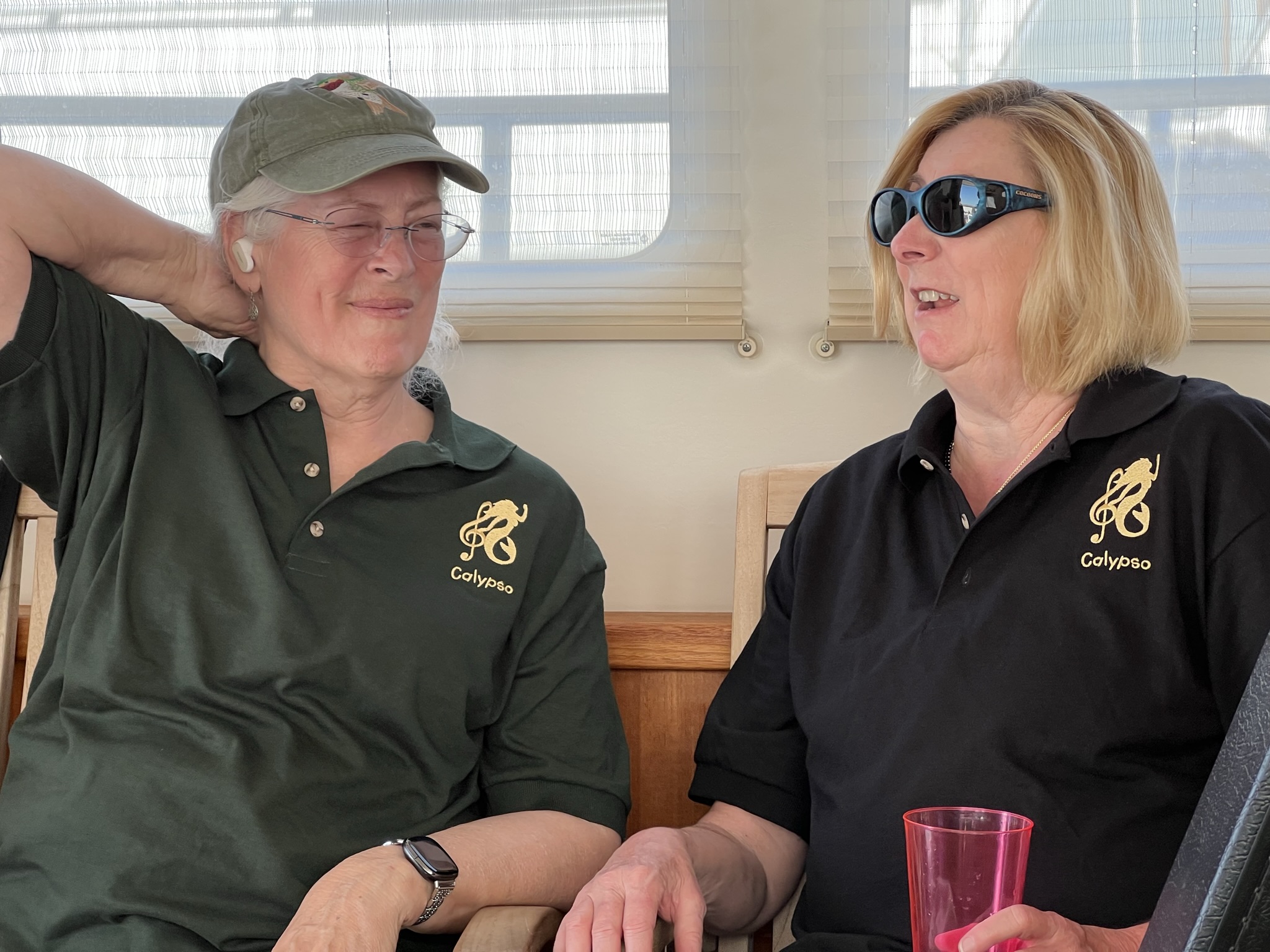
After loop completion Calypso was sold to a couple who renamed her Never say Never (never say you will never do the loop). The story of that MainShip 42 continues today with her 4th Loop. Because all maintenance and ship logs are removed after a renaming ceremony and not returned to the vessel, the vessel history is only known through legal documentation and word of mouth. The Loop Life may have started with this Mainship.
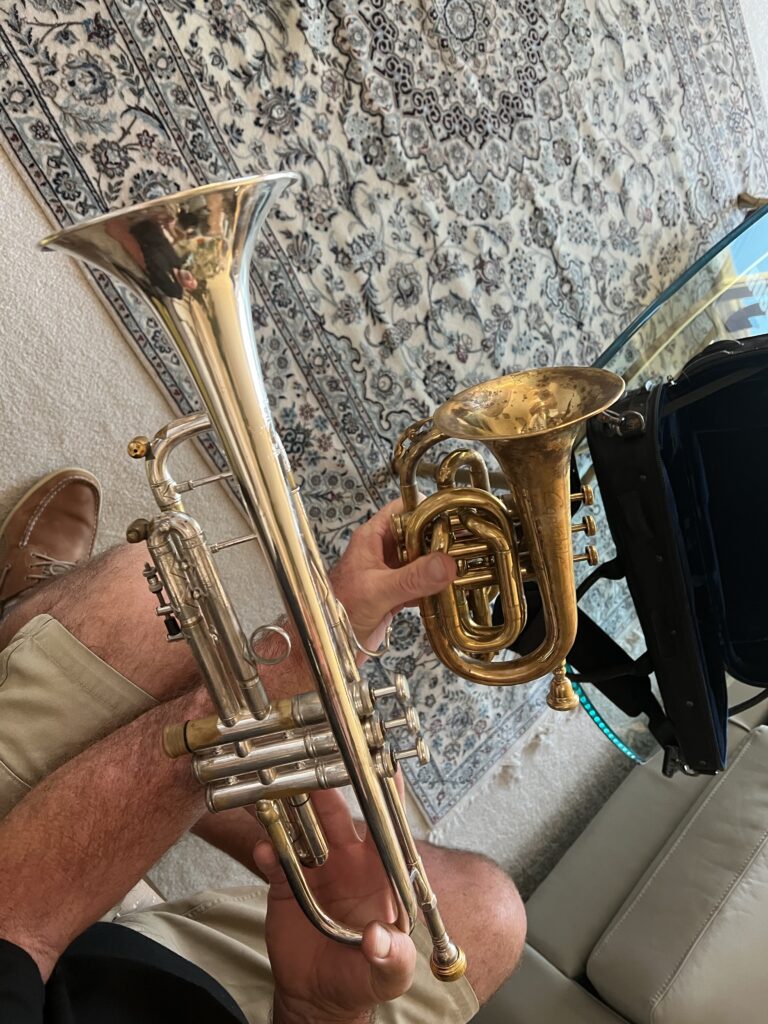
By renaming Seven Bridges to Calypso, the Mainship 42 was honored and the fortune, logos, swag, and named articles transferred. At lest that is how I see the purpose for the renaming. The logo is impressive, a mermaid and G Clef, one of the leftmost symbols on a staff in western music. Steve Stanley is a trumpet player. The logo could also be a reason. And now you know the rest of the story.
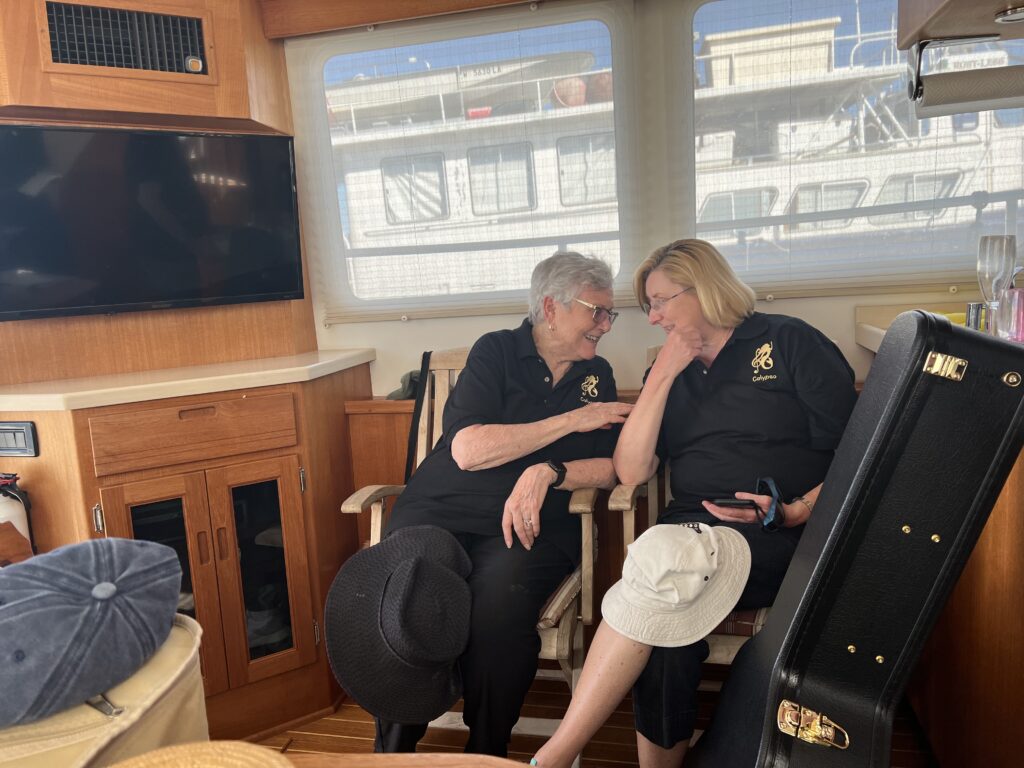




Three As Lucky https://youtu.be/nmgnmScExW0